#Sean Secret Music
Explore tagged Tumblr posts
Text
Jordskred (Original Film Soundtrack)
#jordskred film soundtrack#sean secret#anton forsdik#edvin ryding#spotify#soundtrack#film#kortfilm#film music#filmmaker#coming soon#afpitch#sweden#actors#film making#filmmaking#Sean Secret Music#Spotify
3 notes
·
View notes
Text
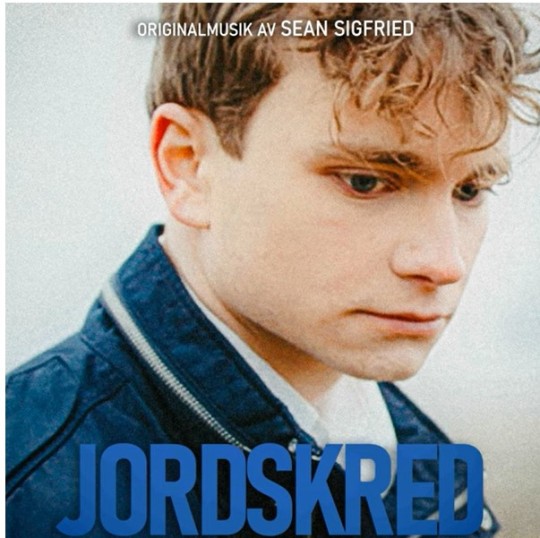
Jordskred (Original Film Soundtrack)
#anton forsdik#actor#film#antonforsdik#jordskred#Landslide#edvin ryding#Sean Secret Music#julius wadman#afpitch#music#soundtrack#sass wolgers#film festival#swedish film
0 notes
Text
ooc: Odysseus fans, I've got a question!
Poll edit: Question should be "Was/Will Be"
#ooc post#odysseus#the odyssey#the iliad#odysseus of ithaca#poll time#troy 2004#the return 2024#sean bean#ralph fiennes#yes#secret third option is Jorge Rivera-Herrans#epic the musical#jorge rivera herrans
29 notes
·
View notes
Text
#soundcloud#djmix#house#funkyhouse#funk#music#gaypride#blacklivesmatter#disco#aunt b#hiphop#indie#kamala harris#prince#andre cymone#notoriousb.i.g.#hifi sean#frankie goes to hollywood#the orb#lee scratch perry#x-coast#peter gabriel#raye#secret knowledge#vintage culture#razormaid#david mcalmont#tronik youth#adam sellouk#starseed105
2 notes
·
View notes
Text
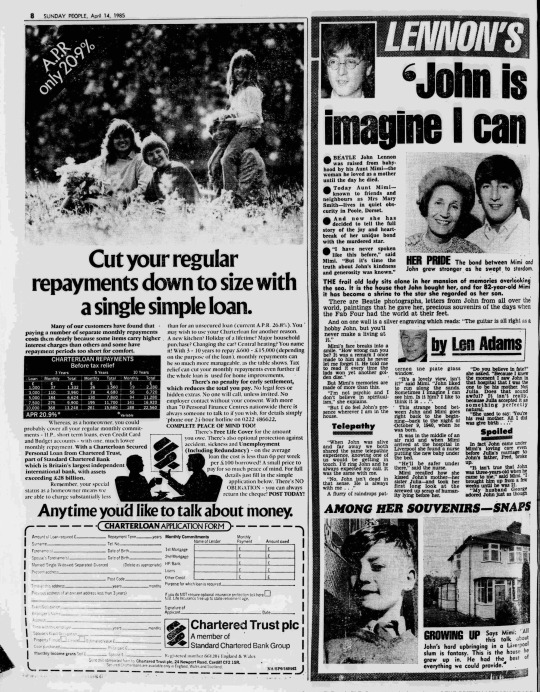
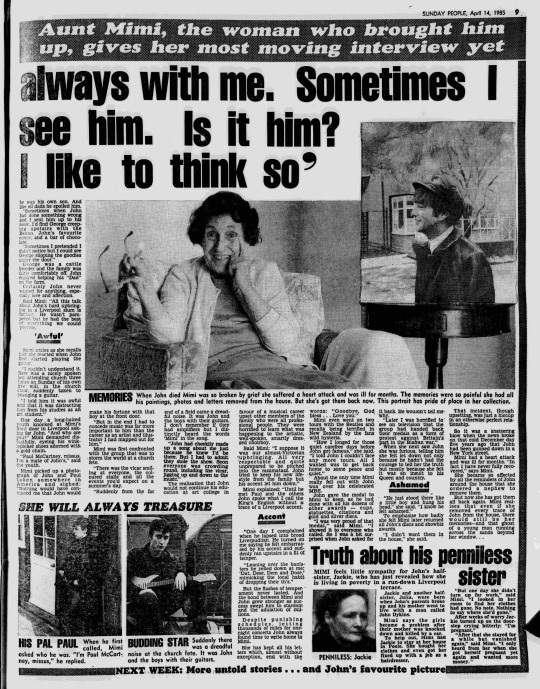
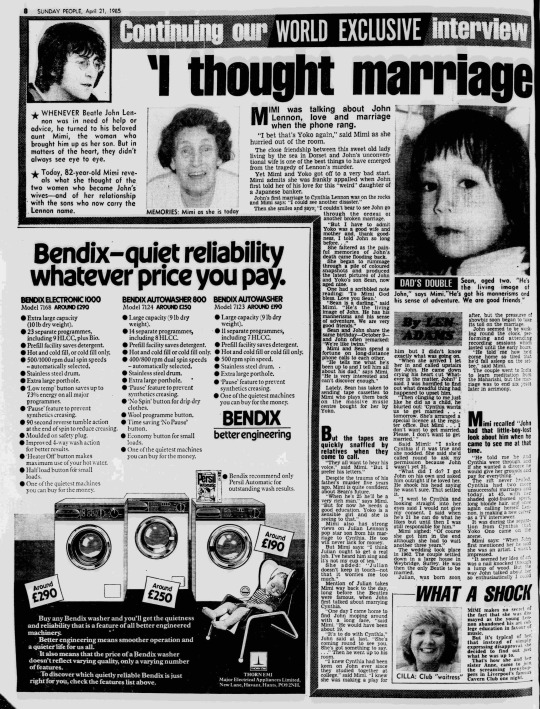
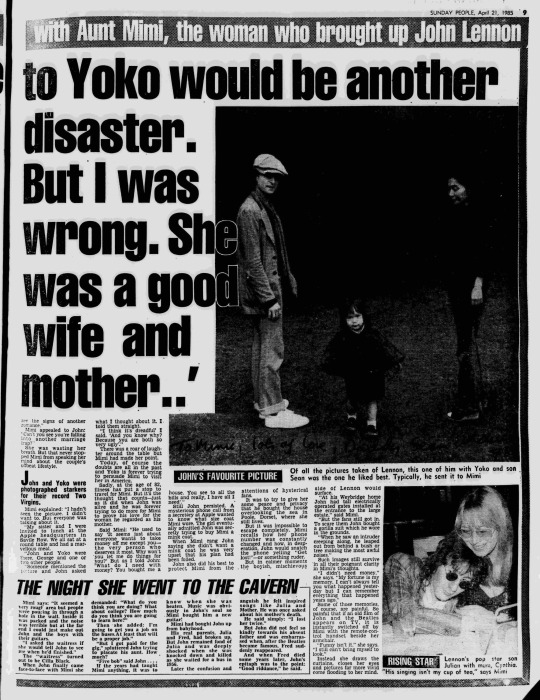
14 & 21 April 1985, Two part interview with Mimi for Sunday People
#john and his gorilla suit. always glad when he finds a use for it.#mimi saying julian should get a real job and stop trying a music career is her trying to be right with that take at least once#'mimi says the girls became a problem after their mother was knocked down and killed by a car.'🫣#i know most of this in bits but here to have it as a whole#could also post the article on john's sisters 'secret family' if anyone wants#mimi smith#john lennon#talks about sean yoko julian and cynthia
14 notes
·
View notes
Text
I have a lot of movies I really love, and a few I really really love, but I can only call one my favorite ever:
I’m thinking of adding more movies to my “tumblr’s favorite movies” letterboxd list, so put in the tags what your favorite movie is, no matter the genre, and only one!
here is the list if you're interested to see other people's favorites (x)
#the secret life of walter mitty#it is just perfect#the cinematography#the music#the songs#jose gonzalez#the acting#ben stiller#kristen wiig#kathryn hahn#shirley maclaine#adam scott#sean penn#the story is so good#he is literally me#movies#polls#cinema#media
12K notes
·
View notes
Text
The Oral History of Take This To Your Grave – transcription under the cut
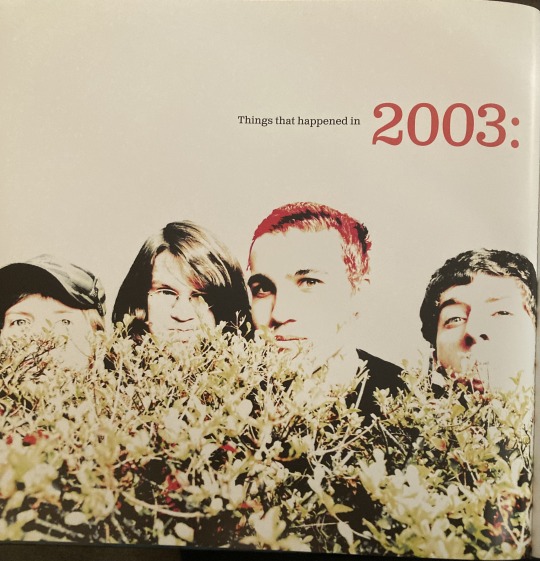
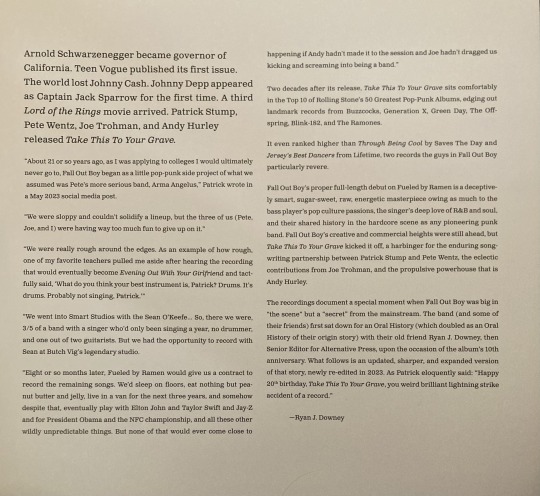
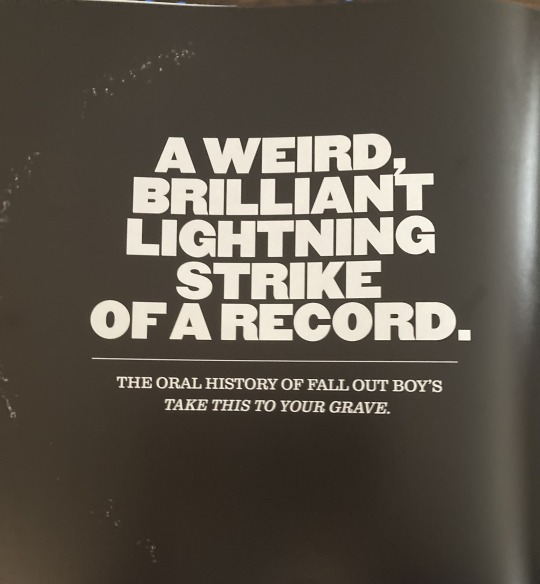
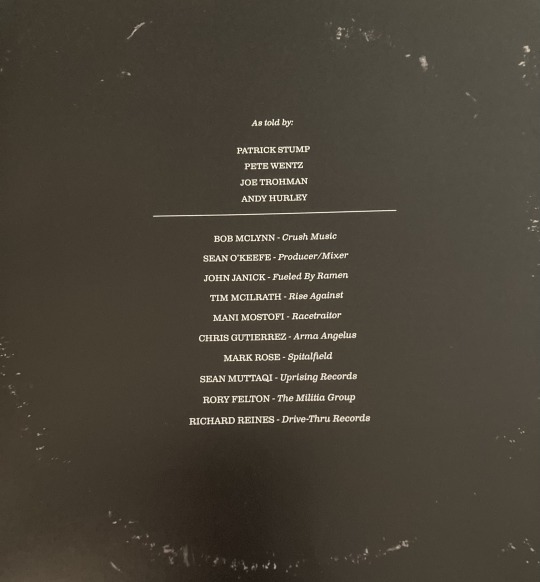
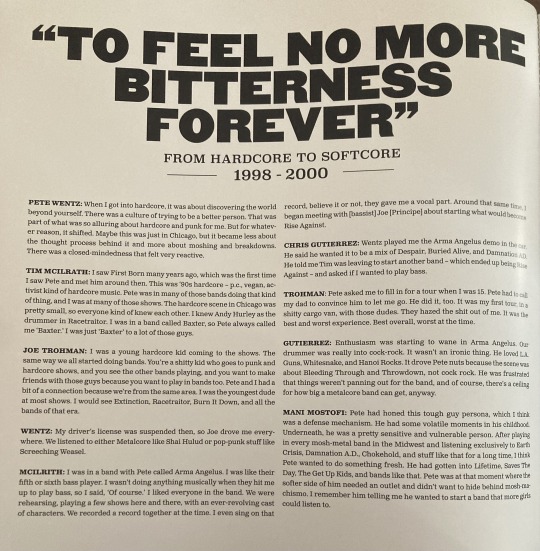
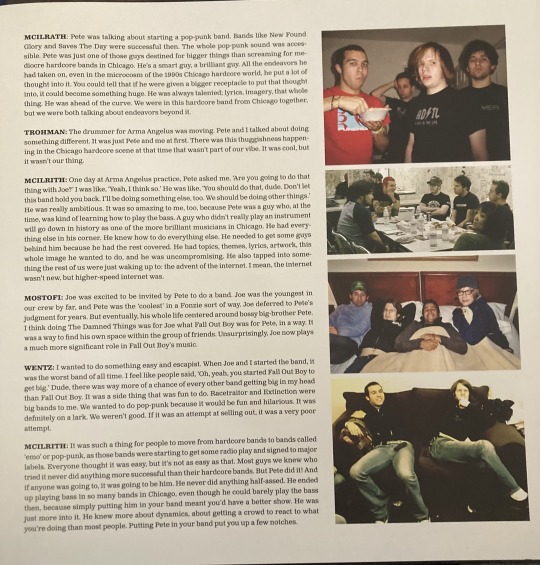

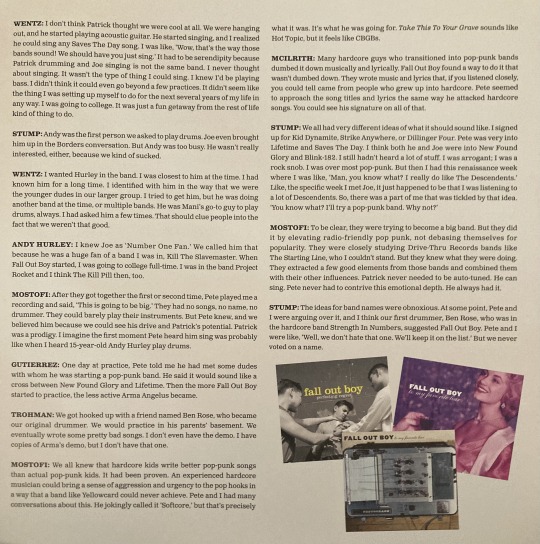
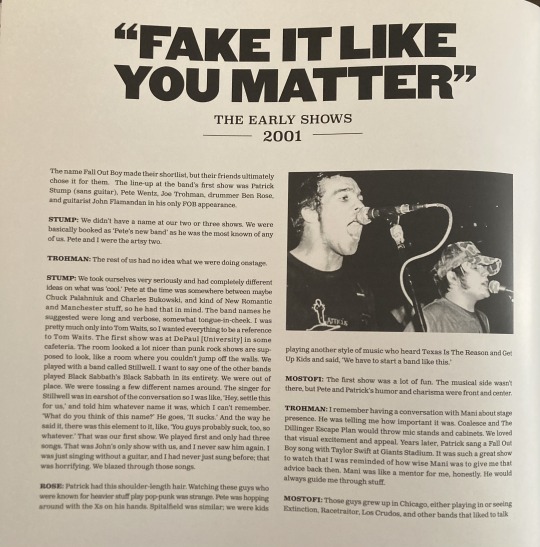
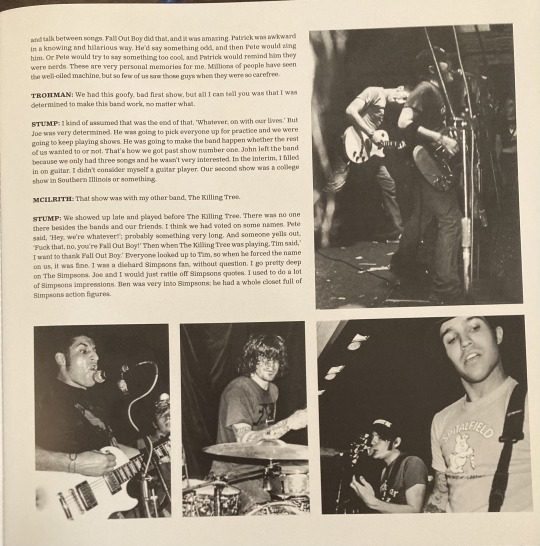
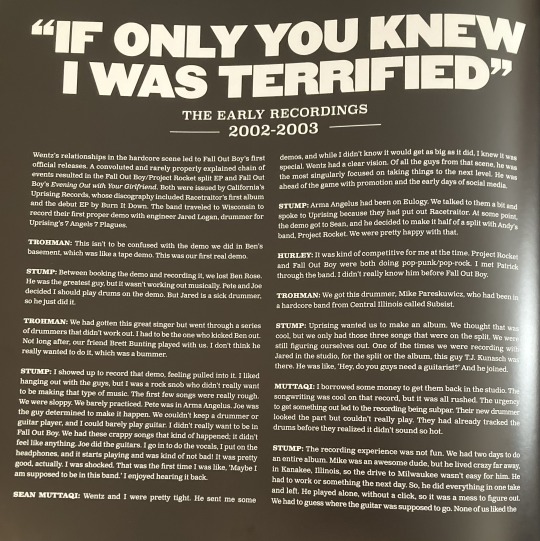
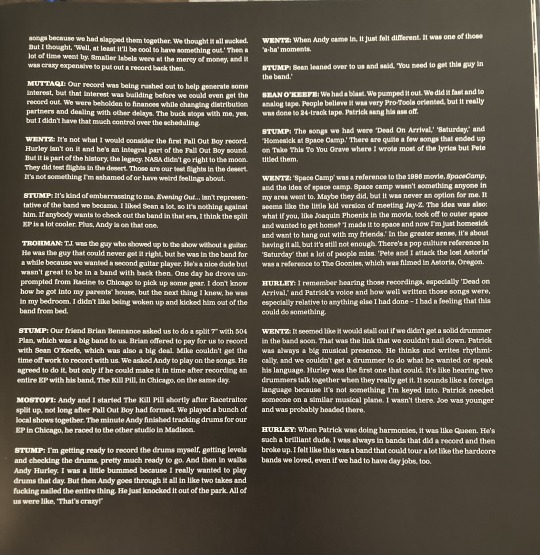
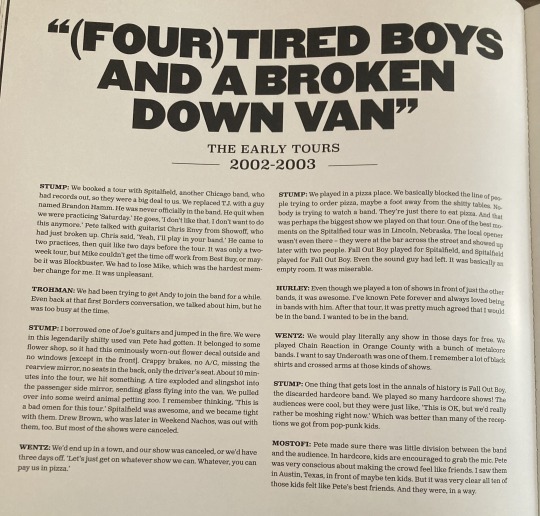
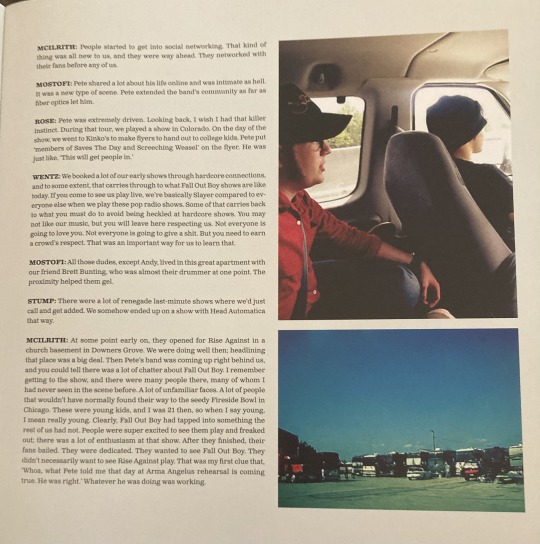
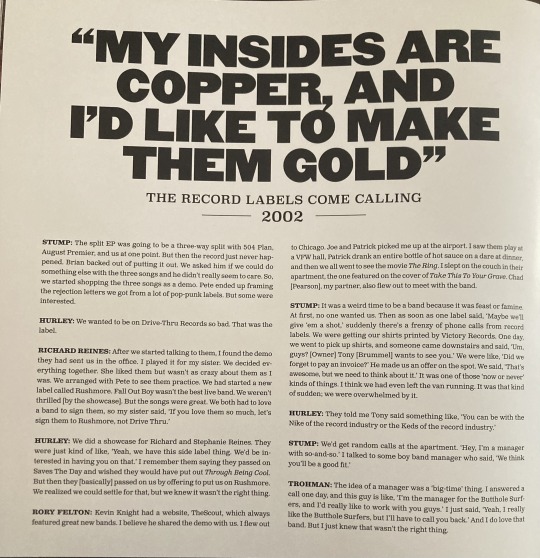
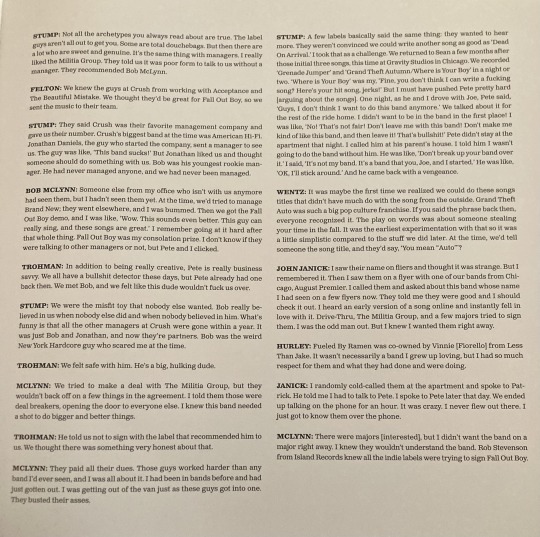
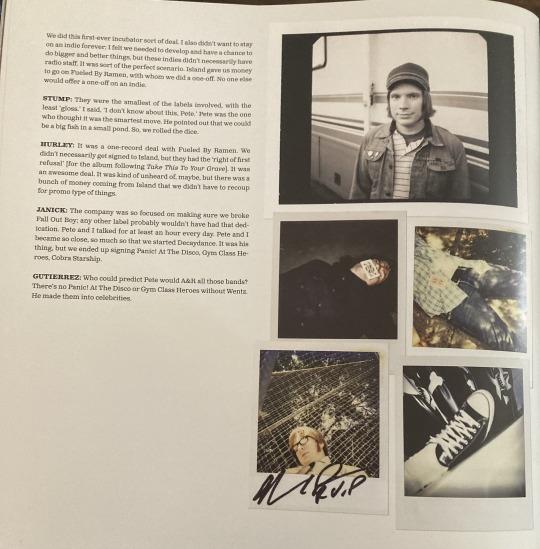
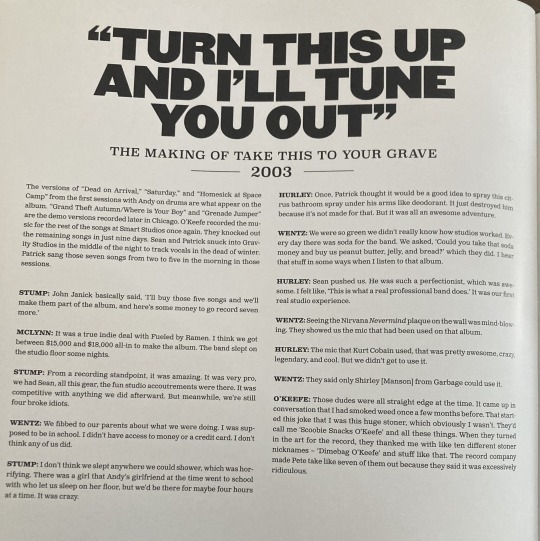
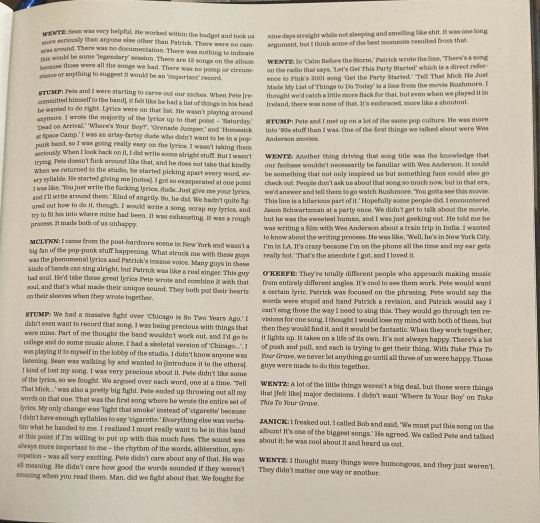
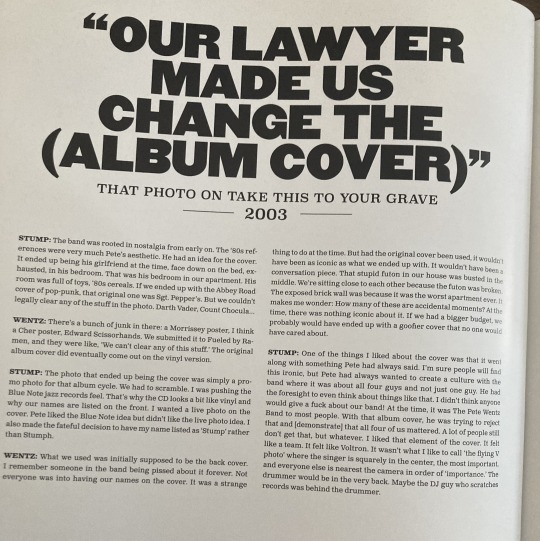
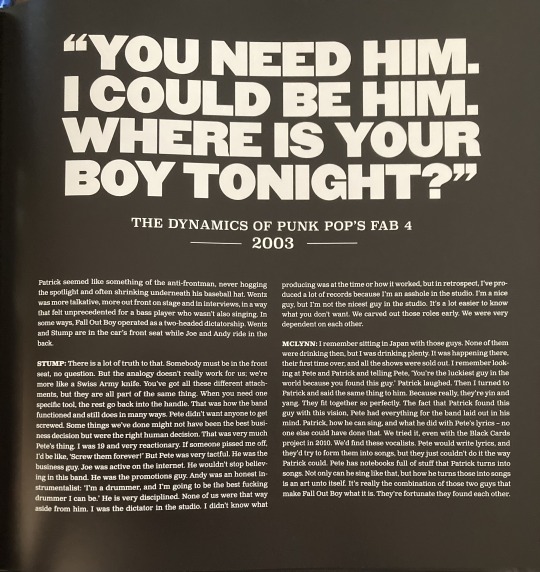
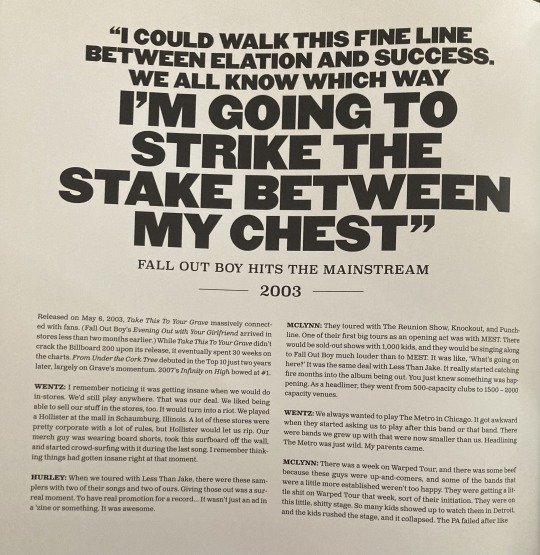
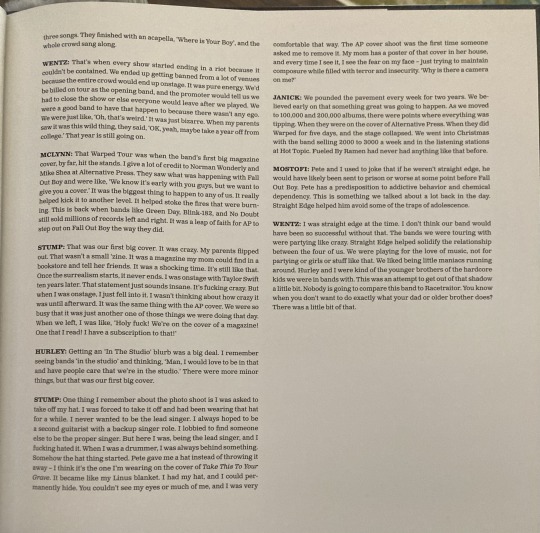
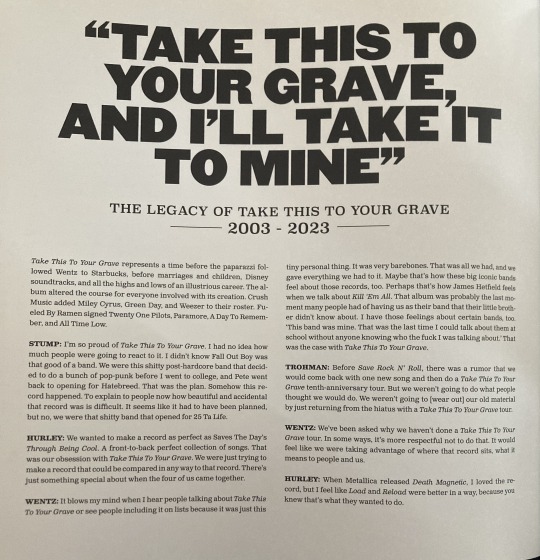
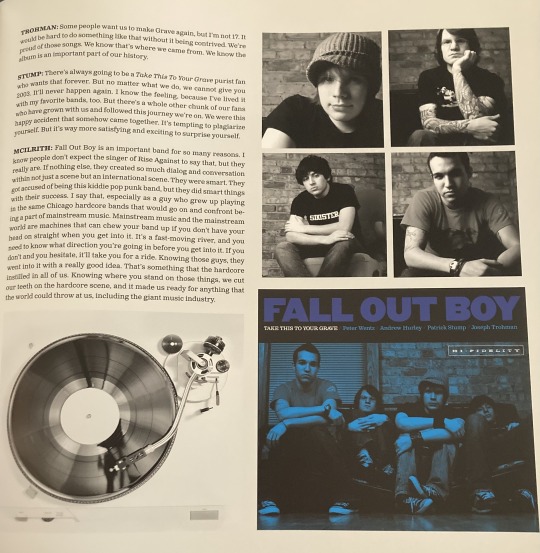
The pages that are just photographs, I haven't included. This post is already long enough.
Things that happened in 2003: Arnold Schwarzenegger became governor of California. Teen Vogue published its first issue. The world lost Johnny Cash. Johnny Depp appeared as Captain Jack Sparrow for the first time. A third Lord of the Rings movie arrived. Patrick Stump, Pete Wentz, Joe Trohman, and Andy Hurley released Take This To Your Grave.
"About 21 years ago or so, as I was applying to colleges I would ultimately never go to, Fall Out Boy began as a little pop-punk side project of what we assumed was Pete's more serious band, Arma Angelus," Patrick wrote in a May 2023 social media post.
"We were sloppy and couldn't solidify a lineup, but the three of us (Pete, Joe, and I) were having way too much fun to give up on it."
"We were really rough around the edges. As an example of how rough, one of my favorite teachers pulled me aside after hearing the recording that would eventually become Evening Out With Your Girlfriend and tactfully said, 'What do you think your best instrument is, Patrick? Drums. It's drums. Probably not singing, Patrick.'"
"We went into Smart Studios with the Sean O'Keefe... So, there we were, 3/5 of a band with a singer who'd only been singing a year, no drummer, and one out of two guitarists. But we had the opportunity to record with Sean at Butch Vig's legendary studio.
"Eight or so months later, Fueled by Ramen would give us a contract to record the remaining songs. We'd sleep on floors, eat nothing but peanut butter and jelly, live in a van for the next three years, and somehow despite that, eventually play with Elton John and Taylor Swift and Jay-Z and for President Obama and the NFC championship, and all these other wildly unpredictable things. But none of that would ever come close to happening if Andy hadn't made it to the session and Joe hadn't dragged us kicking and screaming into being a band."
Two decades after its release, Take This To Your Grave sits comfortable in the Top 10 of Rolling Stone's 50 Greatest Pop-Punk Albums, edging out landmark records from Buzzcocks, Generation X, Green Day, The Offspring, Blink-182, and The Ramones.
It even ranked higher than Through Being Cool by Saves The Day and Jersey's Best Dancers from Lifetime, two records the guys in Fall Out Boy particularly revere.
Fall Out Boy's proper full-length debut on Fueled by Ramen is a deceptively smart, sugar-sweet, raw, energetic masterpiece owing as much to the bass player's pop culture passions, the singers deep love of R&B and soul, and their shared history in the hardcore scene as any pioneering punk band. Fall Out Boy's creative and commercial heights were still ahead, but Take This To Your Grave kicked it off, a harbinger for the enduring songwriting partnership between Patrick Stump and Pete Wentz, the eclectic contributions from Joe Trohman, and the propulsive powerhouse that is Andy Hurley.
The recordings document a special moment when Fall Out Boy was big in "the scene" but a "secret" from the mainstream. The band (and some of their friends) first sat down for an Oral History (which doubled as an Oral History of their origin story) with their old friend Ryan J. Downey, then Senior Editor for Alternative Press, upon the occasion of the album's 10th anniversary. What follows is an updated, sharper, and expanded version of that story, newly re-edited in 2023. As Patrick eloquently said: "Happy 20th birthday, Take This To Your Grave, you weird brilliant lightning strike accident of a record."
– Ryan J. Downey.
A Weird, Brilliant Lightning Strike Of A Record. The Oral History Of Fall Out Boy's Take This To Your Grave.
As told by:
Patrick Stump
Pete Wentz
Joe Trohman
Andy Hurley
Bob McLynn - Crush Music
Sean O'Keefe - Producer/Mixer
John Janick - Fueled By Ramen
Tim McIlrath - Rise Against
Mani Mostofi - Racetraitor
Chris Gutierrez - Arma Angelus
Mark Rose - Spitalfield
Sean Muttaqi - Uprising Records
Rory Felton - The Militia Group
Richard Reines - Drive-Thru Records
"To Feel No More Bitterness Forever" - From Hardcore to Softcore, 1998-2000
PETE WENTZ: When I got into hardcore, it was about discovering the world beyond yourself. There was a culture of trying to be a better person. That was part of what was so alluring about hardcore and punk for me. But for whatever reason, it shifted. Maybe this was just in Chicago, but it became less about the thought process behind it and more about moshing and breakdowns. There was a close-mindedness that felt very reactive.
TIM MCILRITH: I saw First Born many years ago, which was the first time I saw Pete and met him around then. This was '90s hardcore - p.c., vegan, activist kind of hardcore music. Pete was in many of those bands doing that kind of thing, and I was at many of those shows. The hardcore scene in Chicago was pretty small, so everyone kind of knew each other. I knew Andy Hurley as the drummer in Racetraitor. I was in a band called Baxter, so Pete always called me 'Baxter.' I was just 'Baxter' to a lot of those guys.
JOE TROHMAN: I was a young hardcore kid coming to the shows. The same way we all started doing bands. You're a shitty kid who goes to punk and hardcore shows, and you see the other bands playing, and you want to make friends with those guys because you want to play in bands too. Pete and I had a bit of a connection because we're from the same area. I was the youngest dude at most shows. I would see Extinction, Racetraitor, Burn It Down, and all the bands of that era.
WENTZ: My driver's license was suspended then, so Joe drove me everywhere. We listened to either Metalcore like Shai Hulud or pop-punk stuff like Screeching Weasel.
MCILRITH: I was in a band with Pete called Arma Angelus. I was like their fifth or sixth bass player. I wasn't doing anything musically when they hit me up to play bass, so I said, 'Of course.' I liked everyone in the band. We were rehearsing, playing a few shows here and there, with an ever-revolving cast of characters. We recorded a record together at the time. I even sing on that record, believe it or not, they gave me a vocal part. Around that same time, I began meeting with [bassist] Joe [Principe] about starting what would become Rise Against.
CHRIS GUTIERREZ: Wentz played me the Arma Angelus demo in the car. He said he wanted it to be a mix of Despair, Buried Alive, and Damnation A.D. He told me Tim was leaving to start another band - which ended up being Rise Against - and asked if I wanted to play bass.
TROHMAN: Pete asked me to fill in for a tour when I was 15. Pete had to call my dad to convince him to let me go. He did it, too. It was my first tour, in a shitty cargo van, with those dudes. They hazed the shit out of me. It was the best and worst experience. Best overall, worst at the time.
GUTIERREZ: Enthusiasm was starting to wane in Arma Angelus. Our drummer was really into cock-rock. It wasn't an ironic thing. He loved L.A. Guns, Whitesnake, and Hanoi Rocks. It drove Pete nuts because the scene was about Bleeding Through and Throwdown, not cock rock. He was frustrated that things weren't panning out for the band, and of course, there's a ceiling for how big a metalcore band can get, anyway.
MANI MOSTOFI: Pete had honed this tough guy persona, which I think was a defense mechanism. He had some volatile moments in his childhood. Underneath, he was a pretty sensitive and vulnerable person. After playing in every mosh-metal band in the Midwest and listening exclusively to Earth Crisis, Damnation A.D., Chokehold, and stuff like that for a long time, I think Pete wanted to do something fresh. He had gotten into Lifetime, Saves The Day, The Get Up Kids, and bands like that. Pete was at that moment where the softer side of him needed an outlet, and didn't want to hide behind mosh-machismo. I remember him telling me he wanted to start a band that more girls could listen to.
MCILRATH: Pete was talking about starting a pop-punk band. Bands like New Found Glory and Saves The Day were successful then. The whole pop-punk sound was accessible. Pete was just one of those guys destined for bigger things than screaming for mediocre hardcore bands in Chicago. He's a smart guy, a brilliant guy. All the endeavors he had taken on, even in the microcosm of the 1990s Chicago hardcore world, he put a lot of though into it. You could tell that if he were given a bigger receptacle to put that thought into, it could become something huge. He was always talented: lyrics, imagery, that whole thing. He was ahead of the curve. We were in this hardcore band from Chicago together, but we were both talking about endeavors beyond it.
TROHMAN: The drummer for Arma Angelus was moving. Pete and I talked about doing something different. It was just Pete and me at first. There was this thuggishness happening in the Chicago hardcore scene at that time that wasn't part of our vibe. It was cool, but it wasn't our thing.
MCILRITH: One day at Arma Angelus practice, Pete asked me, 'Are you going to do that thing with Joe?' I was like, 'Yeah, I think so.' He was like, 'You should do that, dude. Don't let this band hold you back. I'll be doing something else, too. We should be doing other things.' He was really ambitious. It was so amazing to me, too, because Pete was a guy who, at the time, was kind of learning how to play the bass. A guy who didn't really play an instrument will do down in history as one of the more brilliant musicians in Chicago. He had everything else in his corner. He knew how to do everything else. He needed to get some guys behind him because he had the rest covered. He had topics, themes, lyrics, artwork, this whole image he wanted to do, and he was uncompromising. He also tapped into something the rest of us were just waking up to: the advent of the internet. I mean, the internet wasn't new, but higher-speed internet was.
MOSTOFI: Joe was excited to be invited by Pete to do a band. Joe was the youngest in our crew by far, and Pete was the 'coolest' in a Fonzie sort of way. Joe deferred to Pete's judgement for years. But eventually, his whole life centered around bossy big-brother Pete. I think doing The Damned Things was for Joe what Fall Out Boy was for Pete, in a way. It was a way to find his own space within the group of friends. Unsurprisingly, Joe now plays a much more significant role in Fall Out Boy's music.
WENTZ: I wanted to do something easy and escapist. When Joe and I started the band, it was the worst band of all time. I feel like people said, 'Oh, yeah, you started Fall Out Boy to get big.' Dude, there was way more of a chance of every other band getting big in my head than Fall Out Boy. It was a side thing that was fun to do. Racetraitor and Extinction were big bands to me. We wanted to do pop-punk because it would be fun and hilarious. It was definitely on a lark. We weren't good. If it was an attempt at selling out, it was a very poor attempt.
MCILRITH: It was such a thing for people to move from hardcore bands to bands called 'emo' or pop-punk, as those bands were starting to get some radio play and signed to major labels. Everyone thought it was easy, but it's not as easy as that. Most guys we knew who tried it never did anything more successful than their hardcore bands. But Pete did it! And if anyone was going to, it was going to be him. He never did anything half-assed. He ended up playing bass in so many bands in Chicago, even though he could barely play the bass then, because simply putting him in your band meant you'd have a better show. He was just more into it. He knew more about dynamics, about getting a crowd to react to what you're doing than most people. Putting Pete in your band put you up a few notches.
"I'm Writing You A Chorus And Here Is Your Verse" - When Pete met Patrick, early 2001.
MARK ROSE: Patrick Stump played drums in this grindcore band called Grinding Process. They had put out a live split cassette tape.
PATRICK STUMP: My ambition always outweighed my ability or actual place in the world. I was a drummer and played in many bands and tried to finagle my way into better ones but never really managed. I was usually outgunned by the same two guys: this guy Rocky Senesce; I'm not sure if he's playing anymore, but he was amazing. And this other guy, De'Mar Hamilton, who is now in Plain White T's. We'd always go out for the same bands. I felt like I was pretty good, but then those guys just mopped the floor with me. I hadn't been playing music for a few months. I think my girlfriend dumped me. I was feeling down. I wasn't really into pop-punk or emo. I think at the time I was into Rhino Records box sets.
TROHMAN: I was at the Borders in Eden's Plaza in Wilmette, Illinois. My friend Arthur was asking me about Neurosis. Patrick just walked up and started talking to me.
STUMP: I was a bit arrogant and cocky, like a lot of young musicians. Joe was talking kind of loudly and I overheard him say something about Neurosis, and I think I came in kind of snotty, kind of correcting whatever they had said.
TROHMAN: We just started talking about music, and my buddy Arthur got shoved out of the conversation. I told him about the band we were starting. Pete was this local hardcore celebrity, which intrigued Patrick.
STUMP: I had similar conversations with any number of kids my age. This conversation didn't feel crazy special. That's one of the things that's real about [Joe and I meeting], and that's honest about it, that's it's not some 'love at first sight' thing where we started talking about music and 'Holy smokes, we're going to have the best band ever!' I had been in a lot of bands up until then. Hardcore was a couple of years away from me at that point. I was over it, but Pete was in real bands; that was interesting. Now I'm curious and I want to do this thing, or at least see what happens. Joe said they needed a drummer, guitar player, or singer, and I kind of bluffed and said I could do any one of those things for a pop-punk band. I'd had a lot of conversations about starting bands where I meet up with somebody and maybe try to figure out some songs and then we'd never see each other again. There were a lot of false starts and I assumed this would be just another one of those, but it would be fun for this one to be with the guy from Racetraitor and Extinction.
TROHMAN: He gave me the link to his MP3.com page. There were a few songs of him just playing acoustic and singing. He was awesome.
WENTZ: Joe told me we were going to this kid's house who would probably be our drummer but could also sing. He sent me a link to Patrick singing some acoustic thing, but the quality was so horrible it was hard to tell what it was. Patrick answered the door in some wild outfit. He looked like an emo kid but from the Endpoint era - dorky and cool. We went into the basement, and he was like, trying to set up his drums.
TROHMAN: Patrick has said many times that he intended to try out on drums. I was pushing for him to sing after hearing his demos. 'Hey! Sing for us!' I asked him to take out his acoustic guitar. He played songs from Saves The Day's Through Being Cool. I think he sang most of the record to us. We were thrilled. We had never been around someone who could sing like that.
WENTZ: I don't think Patrick thought we were cool at all. We were hanging out, and he started playing acoustic guitar. He started singing, and I realized he could sing any Saves The Day song. I was like, 'Wow, that's the way those bands sound! We should just have you sing.' It had to be serendipity because Patrick drumming and Joe singing is not the same band. I never thought about singing. It wasn't the type of thing I could sing. I knew I'd be playing bass. I didn't think it'd even go beyond a few practices. It didn't seem like the thing I was setting myself up to do for the next several years of my life in any way. I was going to college. It was just a fun getaway from the rest of life kind of thing to do.
STUMP: Andy was the first person we asked to play drums. Joe even brought him up in the Borders conversation. But Andy was too busy. He wasn't really interested, either, because we kind of sucked.
WENTZ: I wanted Hurley in the band, I was closest to him at the time, I had known him for a long time. I identified with him in the way that we were the younger dudes in our larger group. I tried to get him, but he was doing another band at the time, or multiple bands. He was Mani's go-to guy to play drums, always. I had asked him a few times. That should clue people into the fact that we weren't that good.
ANDY HURLEY: I knew Joe as 'Number One Fan.' We called him that because he was a huge fan of a band I was in, Kill The Slavemaster. When Fall Out Boy started, I was going to college full-time. I was in the band Project Rocket and I think The Kill Pill then, too.
MOSTOFI: After they got together the first or second time, Pete played me a recording and said, 'This is going to be big.' They had no songs, no name, no drummer. They could barely play their instruments. But Pete knew, and we believed him because we could see his drive and Patrick's potential. Patrick was prodigy. I imagine the first moment Pete heard him sing was probably like when I heard 15-year-old Andy Hurley play drums.
GUTIERREZ: One day at practice, Pete told me he had met some dudes with whom he was starting a pop-punk band. He said it would sound like a cross between New Found Glory and Lifetime. Then the more Fall Out Boy started to practice, the less active Arma Angelus became.
TROHMAN: We got hooked up with a friend named Ben Rose, who became our original drummer. We would practice in his parents' basement. We eventually wrote some pretty bad songs. I don't even have the demo. I have copies of Arma's demo, but I don't have that one.
MOSTOFI: We all knew that hardcore kids write better pop-punk songs than actual pop-punk kids. It had been proven. An experienced hardcore musician could bring a sense of aggression and urgency to the pop hooks in a way that a band like Yellowcard could never achieve. Pete and I had many conversations about this. He jokingly called it 'Softcore,' but that's precisely what it was. It's what he was going for. Take This To Your Grave sounds like Hot Topic, but it feels like CBGBs.
MCILRITH: Many hardcore guys who transitioned into pop-punk bands dumbed it down musically and lyrically. Fall Out Boy found a way to do it that wasn't dumbed down. They wrote music and lyrics that, if you listened closely, you could tell came from people who grew up into hardcore. Pete seemed to approach the song titles and lyrics the same way he attacked hardcore songs. You could see his signature on all of that.
STUMP: We all had very different ideas of what it should sound like. I signed up for Kid Dynamite, Strike Anywhere, or Dillinger Four. Pete was very into Lifetime and Saves The Day. I think both he and Joe were into New Found Glory and Blink-182. I still hadn't heard a lot of stuff. I was arrogant; I was a rock snob. I was over most pop-punk. But then I had this renaissance week where I was like, 'Man, you know what? I really do like The Descendents.' Like, the specific week I met Joe, it just happened to be that I was listening to a lot of Descendents. So, there was a part of me that was tickled by that idea. 'You know what? I'll try a pop-punk band. Why not?'
MOSTOFI: To be clear, they were trying to become a big band. But they did it by elevating radio-friendly pop punk, not debasing themselves for popularity. They were closely studying Drive-Thru Records bands like The Starting Line, who I couldn't stand. But they knew what they were doing. They extracted a few good elements from those bands and combined them with their other influences. Patrick never needed to be auto-tuned. He can sing. Pete never had to contrive this emotional depth. He always had it.
STUMP: The ideas for band names were obnoxious. At some point, Pete and I were arguing over it, and I think our first drummer, Ben Rose, who was in the hardcore band Strength In Numbers, suggested Fall Out Boy. Pete and I were like, 'Well, we don't hate that one. We'll keep it on the list.' But we never voted on a name.
"Fake It Like You Matter" - The Early Shows, 2001
The name Fall Out Boy made their shortlist, but their friends ultimately chose it for them. The line-up at the band's first show was Patrick Stump (sans guitar), Pete Wentz, Joe Trohman, drummer Ben Rose, and guitarist John Flamandan in his only FOB appearance.
STUMP: We didn't have a name at our two or three shows. We were basically booked as 'Pete's new band' as he was the most known of any of us. Pete and I were the artsy two.
TROHMAN: The rest of us had no idea what we were doing onstage.
STUMP: We took ourselves very seriously and completely different ideas on what was 'cool.' Pete at the time was somewhere between maybe Chuck Palahniuk and Charles Bukowski, and kind of New Romantic and Manchester stuff, so he had that in mind. The band names he suggested were long and verbose, somewhat tongue-in-cheek. I was pretty much only into Tom Waits, so I wanted everything to be a reference to Tom Waits. The first show was at DePaul [University] in some cafeteria. The room looked a lot nicer than punk rock shows are supposed to look, like a room where you couldn't jump off the walls. We played with a band called Stillwell. I want to say one of the other bands played Black Sabbath's Black Sabbath in its entirety. We were out of place. We were tossing a few different names around. The singer for Stillwell was in earshot of the conversation so I was like 'Hey, settle this for us,' and told him whatever name it was, which I can't remember. 'What do you think of this name?' He goes, 'It sucks.' And the way he said it, there was this element to it, like, 'You guys probably suck, too, so whatever.' That was our first show. We played first and only had three songs. That was John's only show with us, and I never saw him again. I was just singing without a guitar, and I had never just sung before; that was horrifying. We blazed through those songs.
ROSE: Patrick had this shoulder-length hair. Watching these guys who were known for heavier stuff play pop-punk was strange. Pete was hopping around with the X's on his hands. Spitalfield was similar; we were kids playing another style of music who heard Texas Is The Reason and Get Up Kids and said, 'We have to start a band like this.'
MOSTOFI: The first show was a lot of fun. The musical side wasn't there, but Pete and Patrick's humor and charisma were front and center.
TROHMAN: I remember having a conversation with Mani about stage presence. He was telling me how important it was. Coalesce and The Dillinger Escape Plan would throw mic stands and cabinets. We loved that visual excitement and appeal. Years later, Patrick sang a Fall Out Boy song with Taylor Swift at Giants Stadium. It was such a great show to watch that I was reminded of how wise Mani was to give me that advice back then. Mani was like a mentor for me, honestly. He would always guide me through stuff.
MOSTOFI: Those guys grew up in Chicago, either playing in or seeing Extinction, Racetraitor, Los Crudos, and other bands that liked to talk and talk between songs. Fall Out Boy did that, and it was amazing. Patrick was awkward in a knowing and hilarious way. He'd say something odd, and then Pete would zing him. Or Pete would try to say something too cool, and Patrick would remind him they were nerds. These are very personal memories for me. Millions of people have seen the well-oiled machine, but so few of us saw those guys when they were so carefree.
TROHMAN: We had this goofy, bad first show, but all I can tell you was that I was determined to make this band work, no matter what.
STUMP: I kind of assumed that was the end of that. 'Whatever, on with our lives.' But Joe was very determined. He was going to pick us up for practice and we were going to keep playing shows. He was going to make the band happen whether the rest of us wanted to or not. That's how we got past show number one. John left the band because we only had three songs and he wasn't very interested. In the interim, I filled in on guitar. I didn't consider myself a guitar player. Our second show was a college show in Southern Illinois or something.
MCILRITH: That show was with my other band, The Killing Tree.
STUMP: We showed up late and played before The Killing Tree. There was no one there besides the bands and our friends. I think we had voted on some names. Pete said 'Hey, we're whatever!'; probably something very long. And someone yells out, 'Fuck that, no, you're Fall Out Boy!' Then when The Killing Tree was playing, Tim said, 'I want to thank Fall Out Boy.' Everyone looked up to Tim, so when he forced the name on us, it was fine. I was a diehard Simpsons fan, without question. I go pretty deep on The Simpsons. Joe and I would just rattle off Simpsons quotes. I used to do a lot of Simpsons impressions. Ben was very into Simpsons; he had a whole closet full of Simpsons action figures.
"If Only You Knew I Was Terrified" - The Early Recordings, 2002-2003
Wentz's relationships in the hardcore scene led to Fall Out Boy's first official releases. A convoluted and rarely properly explained chain of events resulted in the Fall Out Boy/Project Rocket split EP and Fall Out Boy's Evening Out with Your Girlfriend. Both were issued by California's Uprising Records, whose discography included Racetraitor's first album and the debut EP by Burn It Down. The band traveled to Wisconsin to record their first proper demo with engineer Jared Logan, drummer for Uprising's 7 Angels 7 Plagues.
TROHMAN: This isn't to be confused with the demo we did in Ben's basement, which was like a tape demo. This was our first real demo.
STUMP: Between booking the demo and recording it, we lost Ben Rose. He was the greatest guy, but it wasn't working out musically. Pete and Joe decided I should play drums on the demo. But Jared is a sick drummer, so he just did it.
TROHMAN: We had gotten this great singer but went through a series of drummers that didn't work out. I had to be the one who kicked Ben out. Not long after, our friend Brett Bunting played with us. I don't think he really wanted to do it, which was a bummer.
STUMP: I showed up to record that demo, feeling pulled into it. I liked hanging out with the guys, but I was a rock snob who didn't really want to be making that type of music. The first few songs were really rough. We were sloppy. We barely practiced. Pete was in Arma Angelus. Joe was the guy determined to make it happen. We couldn't keep a drummer or guitar player, and I could barely play guitar. I didn't really want to be in Fall Out Boy. We had these crappy songs that kind of happened; it didn't feel like anything. Joe did the guitars. I go in to do the vocals, I put on the headphones, and it starts playing and was kind of not bad! It was pretty good, actually. I was shocked. That was the first time I was like, 'Maybe I am supposed to be in this band.' I enjoyed hearing it back.
SEAN MUTTAQI: Wentz and I were pretty tight. He sent me some demos, and while I didn't know it would get as big as it did, I knew it was special. Wentz had a clear vision. Of all the guys from that scene, he was the most singularly focused on taking things to the next level. He was ahead of the game with promotion and the early days of social media.
STUMP: Arma Angelus had been on Eulogy. We talked to them a bit and spoke to Uprising because they had put out Racetraitor. At some point, the demo got to Sean, and he decided to make it half of a split with Andy's band, Project Rocket. We were pretty happy with that.
HURLEY: It was kind of competitive for me at the time. Project Rocket and Fall Out Boy were both doing pop-punk/pop-rock, I met Patrick through the band. I didn't really know him before Fall Out Boy.
TROHMAN: We got this drummer, Mike Pareskuwicz, who had been in a hardcore band from Central Illinois called Subsist.
STUMP: Uprising wanted us to make an album. We thought that was cool, but we only had those three songs that were on the split. We were still figuring ourselves out. One of the times we were recording with Jared in the studio, for the split or the album, this guy T.J. Kunasch was there. He was like, 'Hey, do you guys need a guitarist?' And he joined.
MUTTAQI: I borrowed some money to get them back in the studio. The songwriting was cool on that record, but it was all rushed. The urgency to get something out led to the recording being subpar. Their new drummer looked the part but couldn't really play. They had already tracked the drums before they realized it didn't sound so hot.
STUMP: The recording experience was not fun. We had two days to do an entire album. Mike was an awesome dude, but he lived crazy far away, in Kanakee, Illinois, so the drive to Milwaukee wasn't easy for him. He had to work or something the next day. So, he did everything in one take and left. He played alone, without a click, so it was a ness to figure out. We had to guess where the guitar was supposed to go. None of us liked the songs because we had slapped them together. We thought it all sucked. But I thought, 'Well, at least it'll be cool to have something out.' Then a lot of time went by. Smaller labels were at the mercy of money, and it was crazy expensive to put out a record back then.
MUTTAQI: Our record was being rushed out to help generate some interest, but that interest was building before we could even get the record out. We were beholden to finances while changing distribution partners and dealing with other delays. The buck stops with me, yes, but I didn't have that much control over the scheduling.
WENTZ: It's not what I would consider the first Fall Out Boy record. Hurley isn't on it and he's an integral part of the Fall Out Boy sound. But it is part of the history, the legacy. NASA didn't go right to the moon. They did test flights in the desert. Those are our test flights in the desert. It's not something I'm ashamed of or have weird feelings about.
STUMP: It's kind of embarrassing to me. Evening Out... isn't representative of the band we became. I liked Sean a lot, so it's nothing against him. If anybody wants to check out the band in that era, I think the split EP is a lot cooler. Plus, Andy is on that one.
TROHMAN: T.J. was the guy who showed up to the show without a guitar. He was the guy that could never get it right, but he was in the band for a while because we wanted a second guitar player. He's a nice dude but wasn't great to be in a band with back then. One day he drove unprompted from Racine to Chicago to pick up some gear. I don't know how he got into my parents' house, but the next thing I knew, he was in my bedroom. I didn't like being woken up and kicked him out of the band from bed.
STUMP: Our friend Brian Bennance asked us to do a split 7" with 504 Plan, which was a big band to us. Brian offered to pay for us to record with Sean O'Keefe, which was also a big deal. Mike couldn't get the time off work to record with us. We asked Andy to play on the songs. He agreed to do it, but only if he could make it in time after recording an entire EP with his band, The Kill Pill, in Chicago, on the same day.
MOSTOFI: Andy and I started The Kill Pill shortly after Racetraitor split up, not long after Fall Out Boy had formed. We played a bunch of local shows together. The minute Andy finished tracking drums for our EP in Chicago, he raced to the other studio in Madison.
STUMP: I'm getting ready to record the drums myself, getting levels and checking the drums, pretty much ready to go. And then in walks Andy Hurley. I was a little bummed because I really wanted to play drums that day. But then Andy goes through it all in like two takes and fucking nailed the entire thing. He just knocked it out of the park. All of us were like, 'That's crazy!'
WENTZ: When Andy came in, It just felt different. It was one of those 'a-ha' moments.
STUMP: Sean leaned over to us and said, 'You need to get this guy in the band.'
SEAN O'KEEFE: We had a blast. We pumped It out. We did it fast and to analog tape. People believe it was very Pro Tools oriented, but it really was done to 24-track tape. Patrick sang his ass off.
STUMP: The songs we had were 'Dead On Arrival,' 'Saturday,' and 'Homesick at Space Camp. There are quite a few songs that ended up on Take This To You Grave where I wrote most of the lyrics but Pete titled them.
WENTZ: 'Space Camp' was a reference to the 1986 movie, SpaceCamp, and the idea of space camp. Space camp wasn't something anyone in my area went to. Maybe they did, but it was never an option for me. It seems like the little kid version of meeting Jay-Z. The idea was also: what if you, like Joaquin Phoenix in the movie, took off to outer space and wanted to get home? 'I made it to space and now I'm just homesick and want to hang out with my friends.' In the greater sense, it's about having it all, but it's still not enough. There's a pop culture reference in 'Saturday' that a lot of people miss. 'Pete and I attack the lost Astoria' was a reference to The Goonies, which was filmed in Astoria, Oregon.
HURLEY: I remember hearing those recordings, especially 'Dead on Arrival,' and Patrick's voice and how well written those songs were, especially relative to anything else I had done - I had a feeling that this could do something.
WENTZ: It seemed like it would stall out if we didn't get a solid drummer in the band soon. That was the link that we couldn't nail down. Patrick was always a big musical presence. He thinks and writes rhythmi-cally, and we couldn't get a drummer to do what he wanted or speak his language. Hurley was the first one that could. It's like hearing two drummers talk together when they really get it. It sounds like a foreign language because it's not something I'm keyed into. Patrick needed someone on a similar musical plane. I wasn't there. Joe was younger and was probably headed there.
HURLEY: When Patrick was doing harmonies, it was like Queen. He's such a brilliant dude. I was always in bands that did a record and then broke up. I felt like this was a band that could tour a lot like the hardcore bands we loved, even if we had to have day jobs, too.
"(Four) Tired Boys And A Broken Down Van" - The Early Tours, 2002-2003
STUMP: We booked a tour with Spitalfield, another Chicago band, who had records out, so they were a big deal to us. We replaced T.J. with a guy named Brandon Hamm. He was never officially in the band. He quit when we were practicing 'Saturday.' He goes, 'I don't like that. I don't want to do this anymore.' Pete talked with guitarist Chris Envy from Showoff, who had just broken up. Chris said, 'Yeah, I'll play in your band.' He came to two practices, then quit like two days before the tour. It was only a two-week tour, but Mike couldn't get the time off work from Best Buy, or maybe it was Blockbuster. We had to lose Mike, which was the hardest member change for me. It was unpleasant.
TROHMAN: We had been trying to get Andy to join the band for a while. Even back at that first Borders conversation, we talked about him, but he was too busy at the time.
STUMP: I borrowed one of Joe's guitars and jumped in the fire. We were in this legendarily shitty used van Pete had gotten. It belonged to some flower shop, so it had this ominously worn-out flower decal outside and no windows [except in the front]. Crappy brakes, no A/C, missing the rearview mirror, no seats in the back, only the driver's seat. About 10 minutes into the tour, we hit something. A tire exploded and slingshot into the passenger side mirror, sending glass flying into the van. We pulled over into some weird animal petting zoo. I remember thinking, 'This is a bad omen for this tour.' Spitalfield was awesome, and we became tight with them. Drew Brown, who was later in Weekend Nachos, was out with them, too. But most of the shows were canceled.
WENTZ: We'd end up in a town, and our show was canceled, or we'd have three days off. 'Let's just get on whatever show we can. Whatever, you can pay us in pizza.'
STUMP: We played in a pizza place. We basically blocked the line of people trying to order pizza, maybe a foot away from the shitty tables. Nobody is trying to watch a band. They're just there to eat pizza. And that was perhaps the biggest show we played on that tour. One of the best moments on the Spitalfied tour was in Lincoln, Nebraska. The local opener wasn't even there - they were at the bar across the street and showed up later with two people. Fall Out Boy played for Spitalfield, and Spitalfield played for Fall Out Boy. Even the sound guy had left. It was basically an empty room. It was miserable.
HURLEY: Even though we played a ton of shows in front of just the other bands, it was awesome. I've known Pete forever and always loved being in bands with him. After that tour, it was pretty much agreed that I would be in the band. I wanted to be in the band.
WENTZ: We would play literally any show in those days for free. We played Chain Reaction in Orange County with a bunch of metalcore bands. I want to say Underoath was one of them. I remember a lot of black shirts and crossed arms at those kinds of shows. STUMP: One thing that gets lost in the annals of history is Fall Out Boy, the discarded hardcore band. We played so many hardcore shows! The audiences were cool, but they were just like, 'This is OK, but we'd really rather be moshing right now.' Which was better than many of the receptions we got from pop-punk kids.
MOSTOFI: Pete made sure there was little division between the band and the audience. In hardcore, kids are encouraged to grab the mic. Pete was very conscious about making the crowd feel like friends. I saw them in Austin, Texas, in front of maybe ten kids. But it was very clear all ten of those kids felt like Pete's best friends. And they were, in a way.
MCILRITH: People started to get into social networking. That kind of thing was all new to us, and they were way ahead. They networked with their fans before any of us.
MOSTOFI: Pete shared a lot about his life online and was intimate as hell. It was a new type of scene. Pete extended the band's community as far as fiber optics let him.
ROSE: Pete was extremely driven. Looking back, I wish I had that killer instinct. During that tour; we played a show in Colorado. On the day of the show, we went to Kinko's to make flyers to hand out to college kids. Pete put ‘members of Saves The Day and Screeching Weasel’ on the flyer. He was just like, 'This will get people in.'
WENTZ: We booked a lot of our early shows through hardcore connections, and to some extent, that carries through to what Fall Out Boy shows are like today. If you come to see us play live, we're basically Slayer compared to everyone else when we play these pop radio shows. Some of that carries back to what you must do to avoid being heckled at hardcore shows. You may not like our music, but you will leave here respecting us. Not everyone is going to love you. Not everyone is going to give a shit. But you need to earn a crowd's respect. That was an important way for us to learn that.
MOSTOFI: All those dudes, except Andy, lived in this great apartment with our friend Brett Bunting, who was almost their drummer at one point. The proximity helped them gel.
STUMP: There were a lot of renegade last-minute shows where we'd just call and get added. We somehow ended up on a show with Head Automatica that way.
MCILRITH: At some point early on, they opened for Rise Against in a church basement in Downers Grove. We were doing well then; headlining that place was a big deal. Then Pete's band was coming up right behind us, and you could tell there was a lot of chatter about Fall Out Boy. I remember getting to the show, and there were many people there, many of whom I had never seen in the scene before. A lot of unfamiliar faces. A lot of people that wouldn't have normally found their way to the seedy Fireside Bowl in Chicago. These were young kids, and I was 21 then, so when I say young, I mean really young. Clearly, Fall Out Boy had tapped into something the rest of us had not. People were super excited to see them play and freaked out; there was a lot of enthusiasm at that show. After they finished, their fans bailed. They were dedicated. They wanted to see Fall Out Boy. They didn't necessarily want to see Rise Against play. That was my first clue that, 'Whoa, what Pete told me that day at Arma Angelus rehearsal is coming true. He was right.' Whatever he was doing was working.
"My Insides Are Copper, And I'd Like To Make Them Gold" - The Record Labels Come Calling, 2002
STUMP: The split EP was going to be a three-way split with 504 Plan, August Premier, and us at one point. But then the record just never happened. Brian backed out of putting it out. We asked him if we could do something else with the three songs and he didn't really seem to care. So, we started shopping the three songs as a demo. Pete ended up framing the rejection letters we got from a lot of pop-punk labels. But some were interested.
HURLEY: We wanted to be on Drive-Thru Records so bad. That was the label.
RICHARD REINES: After we started talking to them, I found the demo they had sent us in the office. I played it for my sister. We decided everything together. She liked them but wasn't as crazy about them as I was. We arranged with Pete to see them practice. We had started a new label called Rushmore. Fall Out Boy wasn't the best live band. We weren't thrilled [by the showcase]. But the songs were great. We both had to love a band to sign them, so my sister said, 'If you love them so much, let's sign them to Rushmore, not Drive Thru.'
HURLEY: We did a showcase for Richard and Stephanie Reines. They were just kind of like, 'Yeah, we have this side label thing. We'd be interested in having you on that.' I remember them saying they passed on Saves The Day and wished they would have put out Through Being Cool. But then they [basically] passed on us by offering to put us on Rushmore. We realized we could settle for that, but we knew it wasn't the right thing.
RORY FELTON: Kevin Knight had a website, TheScout, which always featured great new bands. I believe he shared the demo with us. I flew out to Chicago. Joe and Patrick picked me up at the airport. I saw them play at a VFW hall, Patrick drank an entire bottle of hot sauce on a dare at dinner, and then we all went to see the movie The Ring. I slept on the couch in their apartment, the one featured on the cover of Take This To Your Grave. Chad [Pearson], my partner, also flew out to meet with the band.
STUMP: It was a weird time to be a band because it was feast or famine. At first, no one wanted us. Then as soon as one label said, 'Maybe we'll give 'em a shot,' suddenly there's a frenzy of phone calls from record labels. We were getting our shirts printed by Victory Records. One day, we went to pick up shirts, and someone came downstairs and said, 'Um, guys? [Owner] Tony [Brummel] wants to see you.' We were like, 'Did we forget to pay an invoice?' He made us an offer on the spot. We said, 'That's awesome, but we need to think about it.' It was one of those 'now or never' kinds of things. I think we had even left the van running. It was that kind of sudden; we were overwhelmed by it.
HURLEY: They told me Tony said something like, 'You can be with the Nike of the record industry or the Keds of the record industry.'
STUMP: We'd get random calls at the apartment. 'Hey, I'm a manager with so-and-so.' I talked to some boy band manager who said, 'We think you'll be a good fit.'
TROHMAN: The idea of a manager was a ‘big-time' thing. I answered a call one day, and this guy is like, 'I'm the manager for the Butthole Surfers, and I'd really like to work with you guys.' I just said, Yeah, I really like the Butthole Surfers, but I'll have to call you back.' And I do love that band. But I just knew that wasn't the right thing.
STUMP: Not all the archetypes you always read about are true. The label guys aren't all out to get you. Some are total douchebags. But then there are a lot who are sweet and genuine. It's the same thing with managers. I really liked the Militia Group. They told us it was poor form to talk to us without a manager. They recommended Bob McLynn.
FELTON: We knew the guys at Crush from working with Acceptance and The Beautiful Mistake. We thought they'd be great for Fall Out Boy, so we sent the music to their team.
STUMP: They said Crush was their favorite management company and gave us their number. Crush's biggest band at the time was American Hi-Fi. Jonathan Daniels, the guy who started the company, sent a manager to see us. The guy was like, "This band sucks!' But Jonathan liked us and thought someone should do something with us. Bob was his youngest rookie manager. He had never managed anyone, and we had never been managed.
BOB MCLYNN: Someone else from my office who isn't with us anymore had seen them, but I hadn't seen them yet. At the time, we'd tried to manage Brand New; they went elsewhere, and I was bummed. Then we got the Fall Out Boy demo, and I was like, Wow. This sounds even better. This guy can really sing, and these songs are great.' I remember going at it hard after that whole thing. Fall Out Boy was my consolation prize. I don't know if they were talking to other managers or not, but Pete and I clicked.
TROHMAN: In addition to being really creative, Pete is really business savvy. We all have a bullshit detector these days, but Pete already had one back then. We met Bob, and we felt like this dude wouldn't fuck us over.
STUMP: We were the misfit toy that nobody else wanted. Bob really believed in us when nobody else did and when nobody believed in him. What's funny is that all the other managers at Crush were gone within a year. It was just Bob and Jonathan, and now they're partners. Bob was the weird New York Hardcore guy who scared me at the time.
TROHMAN: We felt safe with him. He's a big, hulking dude.
MCLYNN: We tried to make a deal with The Militia Group, but they wouldn't back off on a few things in the agreement. I told them those were deal breakers, opening the door to everyone else. I knew this band needed a shot to do bigger and better things.
TROHMAN: He told us not to sign with the label that recommended him to us. We thought there was something very honest about that.
MCLYNN: They paid all their dues. Those guys worked harder than any band I'd ever seen, and I was all about it. I had been in bands before and had just gotten out. I was getting out of the van just as these guys got into one. They busted their asses.
STUMP: A few labels basically said the same thing: they wanted to hear more. They weren't convinced we could write another song as good as 'Dead On Arrival.' I took that as a challenge. We returned to Sean a few months after those initial three songs, this time at Gravity Studios in Chicago. We recorded ‘Grenade Jumper' and 'Grand Theft Autumn/Where is Your Boy' in a night or two. 'Where is Your Boy' was my, 'Fine, you don't think I can write a fucking song? Here's your hit song, jerks!' But I must have pushed Pete pretty hard [arguing about the songs]. One night, as he and I drove with Joe, Pete said, 'Guys, I don't think I want to do this band anymore.' We talked about it for the rest of the ride home. I didn't want to be in the band in the first place! I was like, 'No! That's not fair! Don't leave me with this band! Don't make me kind of like this band, and then leave it! That's bullshit!' Pete didn't stay at the apartment that night. I called him at his parent's house. I told him I wasn't going to do the band without him. He was like, 'Don't break up your band over it.' I said, 'It's not my band. It's a band that you, Joe, and I started.' He was like, 'OK, I'll stick around.' And he came back with a vengeance.
WENTZ: It was maybe the first time we realized we could do these songs titles that didn't have much do with the song from the outside. Grand Theft Auto was such a big pop culture franchise. If you said the phrase back then, everyone recognized it. The play on words was about someone stealing your time in the fall. It was the earliest experimentation with that so it was a little simplistic compared to the stuff we did later. At the time, we'd tell someone the song title, and they'd say, 'You mean "Auto"'?
JOHN JANICK: I saw their name on fliers and thought it was strange. But I remembered it. Then I saw them on a flyer with one of our bands from Chicago, August Premier. I called them and asked about this band whose name I had seen on a few flyers now. They told me they were good and I should check it out. I heard an early version of a song online and instantly fell in love with it. Drive-Thru, The Militia Group, and a few majors tried to sign them. I was the odd man out. But I knew I wanted them right away.
HURLEY: Fueled By Ramen was co-owned by Vinnie [Fiorello] from Less Than Jake. It wasn't necessarily a band I grew up loving, but I had so much respect for them and what they had done and were doing.
JANICK: I randomly cold-called them at the apartment and spoke to Patrick. He told me I had to talk to Pete. I spoke to Pete later that day. We ended up talking on the phone for an hour. It was crazy. I never flew out there. I just got to know them over the phone.
MCLYNN: There were majors [interested], but I didn't want the band on a major right away. I knew they wouldn't understand the band. Rob Stevenson from Island Records knew all the indie labels were trying to sign Fall Out Boy. We did this first-ever incubator sort of deal. I also didn't want to stay on an indie forever; I felt we needed to develop and have a chance to do bigger and better things, but these indies didn't necessarily have radio staff. It was sort of the perfect scenario. Island gave us money to go on Fueled By Ramen, with whom we did a one-off. No one else would offer a one-off on an indie.
STUMP: They were the smallest of the labels involved, with the least 'gloss.' I said, 'I don't know about this, Pete.' Pete was the one who thought it was the smartest move. He pointed out that we could be a big fish in a small pond. So, we rolled the dice.
HURLEY: It was a one-record deal with Fueled By Ramen. We didn't necessarily get signed to Island, but they had the 'right of first refusal' [for the album following Take This To Your Grave]. It was an awesome deal. It was kind of unheard of, maybe, but there was a bunch of money coming from Island that we didn't have to recoup for promo type of things.
JANICK: The company was so focused on making sure we broke Fall Out Boy; any other label probably wouldn't have had that dedication. Pete and I talked for at least an hour every day. Pete and I became so close, so much so that we started Decaydance. It was his thing, but we ended up signing Panic! At The Disco, Gym Class Heroes, Cobra Starship.
GUTIERREZ: Who could predict Pete would A&R all those bands? There's no Panic! At The Disco or Gym Class Heroes without Wentz. He made them into celebrities.
"Turn This Up And I'll Tune You Out" - The Making of Take This To You Grave, 2003
The versions of "Dead on Arrival," "Saturday," and "Homesick at Space Camp" from the first sessions with Andy on drums are what appear on the album. "Grand Theft Autumn/Where is Your Boy" and "Grenade Jumper" are the demo versions recorded later in Chicago. O'Keefe recorded the music for the rest of the songs at Smart Studios once again. They knocked out the remaining songs in just nine days. Sean and Patrick snuck into Gravity Studios in the middle of the night to track vocals in the dead of winter. Patrick sang those seven songs from two to five in the morning in those sessions.
STUMP: John Janick basically said, ‘I'll buy those five songs and we'll make them part of the album, and here's some money to go record seven more.'
MCLYNN: It was a true indie deal with Fueled by Ramen. I think we got between $15,000 and $18,000 all-in to make the album. The band slept on the studio floor some nights.
STUMP: From a recording standpoint, it was amazing. It was very pro, we had Sean, all this gear, the fun studio accoutrements were there. It was competitive with anything we did afterward. But meanwhile, we're still four broke idiots.
WENTZ: We fibbed to our parents about what we were doing. I was supposed to be in school. I didn't have access to money or a credit card. I don't think any of us did.
STUMP: I don't think we slept anywhere we could shower, which was horrifying. There was a girl that Andy's girlfriend at the time went to school with who let us sleep on her floor, but we'd be there for maybe four hours at a time. It was crazy.
HURLEY: Once, Patrick thought it would be a good idea to spray this citrus bathroom spray under his arms like deodorant. It just destroyed him because it's not made for that. But it was all an awesome adventure.
WENTZ: We were so green we didn't really know how studios worked. Every day there was soda for the band. We asked, 'Could you take that soda money and buy us peanut butter, jelly, and bread?' which they did. I hear that stuff in some ways when I listen to that album.
HURLEY: Sean pushed us. He was such a perfectionist, which was awesome. I felt like, ‘This is what a real professional band does.' It was our first real studio experience.
WENTZ: Seeing the Nirvana Nevermind plaque on the wall was mind-blowing. They showed us the mic that had been used on that album.
HURLEY: The mic that Kurt Cobain used, that was pretty awesome, crazy, legendary, and cool. But we didn't get to use it.
WENTZ: They said only Shirley Manson] from Garbage could use it.
O'KEEFE: Those dudes were all straight edge at the time. It came up in conversation that I had smoked weed once a few months before. That started this joke that I was this huge stoner, which obviously I wasn't. They'd call me 'Scoobie Snacks O'Keefe' and all these things. When they turned in the art for the record, they thanked me with like ten different stoner nicknames - 'Dimebag O'Keefe' and stuff like that. The record company made Pete take like seven of them out because they said it was excessively ridiculous.
WENTZ: Sean was very helpful. He worked within the budget and took us more seriously than anyone else other than Patrick. There were no cameras around. There was no documentation. There was nothing to indicate this would be some ‘legendary' session. There are 12 songs on the album because those were all the songs we had. There was no pomp or circumstance or anything to suggest it would be an 'important’ record.
STUMP: Pete and I were starting to carve out our niches. When Pete [re-committed himself to the band], it felt like he had a list of things in his head he wanted to do right. Lyrics were on that list. He wasn't playing around anymore. I wrote the majority of the lyrics up to that point - ‘Saturday,' 'Dead on Arrival,' ‘Where's Your Boy?,’ ‘Grenade Jumper,' and ‘Homesick at Space Camp.' I was an artsy-fartsy dude who didn't want to be in a pop-punk band, so I was going really easy on the lyrics. I wasn't taking them seriously. When I look back on it, I did write some alright stuff. But I wasn't trying. Pete doesn't fuck around like that, and he does not take that kindly. When we returned to the studio, he started picking apart every word, every syllable. He started giving me [notes]. I got so exasperated at one point I was like, ‘You just write the fucking lyrics, dude. Just give me your lyrics, and I'll write around them.' Kind of angrily. So, he did. We hadn't quite figured out how to do it, though. I would write a song, scrap my lyrics, and try to fit his into where mine had been. It was exhausting. It was a rough process. It made both of us unhappy.
MCLYNN: I came from the post-hardcore scene in New York and wasn't a big fan of the pop-punk stuff happening. What struck me with these guys was the phenomenal lyrics and Patrick's insane voice. Many guys in these kinds of bands can sing alright, but Patrick was like a real singer. This guy had soul. He'd take these great lyrics Pete wrote and combine it with that soul, and that's what made their unique sound. They both put their hearts on their sleeves when they wrote together.
STUMP: We had a massive fight over 'Chicago is So Two Years Ago.' I didn't even want to record that song. I was being precious with things that were mine. Part of me thought the band wouldn't work out, and I'd go to college and do some music alone. I had a skeletal version of 'Chicago...'. I was playing it to myself in the lobby of the studio. I didn't know anyone was listening. Sean was walking by and wanted to [introduce it to the others]. I kind of lost my song. I was very precious about it. Pete didn't like some of the lyrics, so we fought. We argued over each word, one at a time. 'Tell That Mick...' was also a pretty big fight. Pete ended up throwing out all my words on that one. That was the first song where he wrote the entire set of lyrics. My only change was light that smoke' instead of ‘cigarette' because I didn't have enough syllables to say 'cigarette.' Everything else was verbatim what he handed to me. I realized I must really want to be in this band at this point if I'm willing to put up with this much fuss. The sound was always more important to me - the rhythm of the words, alliteration, syncopation - was all very exciting. Pete didn't care about any of that. He was all meaning. He didn't care how good the words sounded if they weren't amazing when you read them. Man, did we fight about that. We fought for nine days straight while not sleeping and smelling like shit. It was one long argument, but I think some of the best moments resulted from that.
WENTZ: In 'Calm Before the Storm,' Patrick wrote the line, 'There's a song on the radio that says, 'Let's Get This Party Started' which is a direct reference to Pink's 2001 song 'Get the Party Started.' 'Tell That Mick He Just Made My List of Things to Do Today' is a line from the movie Rushmore. I thought we'd catch a little more flack for that, but even when we played it in Ireland, there was none of that. It's embraced, more like a shoutout.
STUMP: Pete and I met up on a lot of the same pop culture. He was more into '80s stuff than I was. One of the first things we talked about were Wes Anderson movies.
WENTZ: Another thing driving that song title was the knowledge that our fanbase wouldn't necessarily be familiar with Wes Anderson. It could be something that not only inspired us but something fans could also go check out. People don't ask us about that song so much now, but in that era, we'd answer and tell them to go watch Rushmore. You gotta see this movie. This line is a hilarious part of it.' Hopefully some people did. I encountered Jason Schwartzman at a party once. We didn't get to talk about the movie, but he was the sweetest human, and I was just geeking out. He told me he was writing a film with Wes Anderson about a train trip in India. I wanted to know about the writing process. He was like, 'Well, he's in New York City, I'm in LA. It's crazy because I'm on the phone all the time and my ear gets really hot.' That's the anecdote I got, and I loved it.
O'KEEFE: They're totally different people who approach making music from entirely different angles. It's cool to see them work. Pete would want a certain lyric. Patrick was focused on the phrasing. Pete would say the words were stupid and hand Patrick a revision, and Patrick would say I can't sing those the way I need to sing this. They would go through ten revisions for one song. I thought I would lose my mind with both of them, but then they would find it, and it would be fantastic. When they work together, it lights up. It takes on a life of its own. It's not always happy. There's a lot of push and pull, and each is trying to get their thing. With Take This To Your Grave, we never let anything go until all three of us were happy. Those guys were made to do this together.
WENTZ: A lot of the little things weren't a big deal, but those were things that [felt like] major decisions. I didn't want 'Where Is Your Boy' on Take This To Your Grave.
JANICK: I freaked out. I called Bob and said, 'We must put this song on the album! It's one of the biggest songs.' He agreed. We called Pete and talked about it; he was cool about it and heard us out.
WENTZ: I thought many things were humongous, and they just weren't. They didn't matter one way or another.
"Our Lawyer Made Us Change The (Album Cover)" - That Photo On Take This To Your Grave, 2003
STUMP: The band was rooted in nostalgia from early on. The '80s references were very much Pete's aesthetic. He had an idea for the cover. It ended up being his girlfriend at the time, face down on the bed, exhausted, in his bedroom. That was his bedroom in our apartment. His room was full of toys, '80s cereals. If we ended up with the Abbey Road cover of pop-punk, that original one was Sgt. Pepper's. But we couldn't legally clear any of the stuff in the photo. Darth Vader, Count Chocula…
WENTZ: There's a bunch of junk in there: a Morrissey poster, I think a Cher poster, Edward Scissorhands. We submitted it to Fueled by Ramen, and they were like, 'We can't clear any of this stuff.’ The original album cover did eventually come out on the vinyl version.
STUMP: The photo that ended up being the cover was simply a promo photo for that album cycle. We had to scramble. I was pushing the Blue Note jazz records feel. That's why the CD looks a bit like vinyl and why our names are listed on the front. I wanted a live photo on the cover. Pete liked the Blue Note idea but didn't like the live photo idea. I also made the fateful decision to have my name listed as 'Stump' rather than Stumph.
WENTZ: What we used was initially supposed to be the back cover. I remember someone in the band being pissed about it forever. Not everyone was into having our names on the cover. It was a strange thing to do at the time. But had the original cover been used, it wouldn't have been as iconic as what we ended up with. It wouldn't have been a conversation piece. That stupid futon in our house was busted in the middle. We're sitting close to each other because the futon was broken. The exposed brick wall was because it was the worst apartment ever. It makes me wonder: How many of these are accidental moments? At the time, there was nothing iconic about it. If we had a bigger budget, we probably would have ended up with a goofier cover that no one would have cared about.
STUMP: One of the things I liked about the cover was that it went along with something Pete had always said. I'm sure people will find this ironic, but Pete had always wanted to create a culture with the band where it was about all four guys and not just one guy. He had the foresight to even think about things like that. I didn't think anyone would give a fuck about our band! At the time, it was The Pete Wentz Band to most people. With that album cover, he was trying to reject that and [demonstrate] that all four of us mattered. A lot of people still don't get that, but whatever. I liked that element of the cover. It felt like a team. It felt like Voltron. It wasn't what I like to call 'the flying V photo' where the singer is squarely in the center, the most important, and everyone else is nearest the camera in order of 'importance.' The drummer would be in the very back. Maybe the DJ guy who scratches records was behind the drummer.
"You Need Him. I Could Be Him. Where Is Your Boy Tonight?" - The Dynamics of Punk Pop's Fab 4, 2003
Patrick seemed like something of the anti-frontman, never hogging the spotlight and often shrinking underneath his baseball hat. Wentz was more talkative, more out front on stage and in interviews, in a way that felt unprecedented for a bass player who wasn't also singing. In some ways, Fall Out Boy operated as a two-headed dictatorship. Wentz and Stump are in the car's front seat while Joe and Andy ride in the back.
STUMP: There is a lot of truth to that. Somebody must be in the front seat, no question. But the analogy doesn't really work for us; were more like a Swiss Army knife. You've got all these different attachments, but they are all part of the same thing. When you need one specific tool, the rest go back into the handle. That was how the band functioned and still does in many ways. Pete didn't want anyone to get screwed. Some things we've done might not have been the best business decision but were the right human decision. That was very much Pete's thing. I was 19 and very reactionary. If someone pissed me off, I'd be like, 'Screw them forever!' But Pete was very tactful. He was the business guy. Joe was active on the internet. He wouldn't stop believing in this band. He was the promotions guy. Andy was an honest instrumentalist: ‘I'm a drummer, and I'm going to be the best fucking drummer I can be.' He is very disciplined. None of us were that way aside from him. I was the dictator in the studio. I didn't know what producing was at the time or how it worked, but in retrospect, I've produced a lot of records because I'm an asshole in the studio. I'm a nice guy, but I'm not the nicest guy in the studio. It's a lot easier to know what you don't want. We carved out those roles early. We were very dependent on each other.
MCLYNN: I remember sitting in Japan with those guys. None of them were drinking then, but I was drinking plenty. It was happening there, their first time over, and all the shows were sold out. I remember looking at Pete and Patrick and telling Pete, ‘You're the luckiest guy in the world because you found this guy.' Patrick laughed. Then I turned to Patrick and said the same thing to him. Because really, they're yin and yang. They fit together so perfectly. The fact that Patrick found this guy with this vision, Pete had everything for the band laid out in his mind. Patrick, how he can sing, and what he did with Pete's lyrics - no one else could have done that. We tried it, even with the Black Cards project in 2010. We'd find these vocalists. Pete would write lyrics, and they'd try to form them into songs, but they just couldn't do it the way Patrick could. Pete has notebooks full of stuff that Patrick turns into songs. Not only can he sing like that, but how he turns those into songs is an art unto itself. It's really the combination of those two guys that make Fall Out Boy what it is. They're fortunate they found each other.
"I Could Walk This Fine Line Between Elation And Success. We All Know Which Way I'm Going To Strike The Stake Between My Chest" - Fall Out Boy Hits the Mainstream, 2003
Released on May 6, 2003, Take This To Your Grave massively connected with fans. (Fall Out Boy's Evening Out with Your Girlfriend arrived in stores less than two months earlier.) While Take This To Your Grave didn't crack the Billboard 200 upon its release, it eventually spent 30 weeks on the charts. From Under the Cork Tree debuted in the Top 10 just two years later, largely on Grave's momentum. 2007's Infinity on High bowed at #1.
WENTZ: I remember noticing it was getting insane when we would do in-stores. We'd still play anywhere. That was our deal. We liked being able to sell our stuff in the stores, too. It would turn into a riot. We played a Hollister at the mall in Schaumburg, Illinois. A lot of these stores were pretty corporate with a lot of rules, but Hollister would let us rip. Our merch guy was wearing board shorts, took this surfboard off the wall, and started crowd-surfing with it during the last song. I remember thinking things had gotten insane right at that moment.
HURLEY: When we toured with Less Than Jake, there were these samplers with two of their songs and two of ours. Giving those out was a surreal moment. To have real promotion for a record... It wasn't just an ad in a 'zine or something. It was awesome.
MCLYNN: They toured with The Reunion Show, Knockout, and Punch-line. One of their first big tours as an opening act was with MEST. There would be sold-out shows with 1,000 kids, and they would be singing along to Fall Out Boy much louder than to MEST. It was like, 'What's going on here?' It was the same deal with Less Than Jake. It really started catching fire months into the album being out. You just knew something was happening. As a headliner, they went from 500-capacity clubs to 1500 - 2000 capacity venues.
WENTZ: We always wanted to play The Metro in Chicago. It got awkward when they started asking us to play after this band or that band. There were bands we grew up with that were now smaller than us. Headlining The Metro was just wild. My parents came.
MCLYNN: There was a week on Warped Tour, and there was some beel because these guys were up-and-comers, and some of the bands that were a little more established weren't too happy. They were getting a little shit on Warped Tour that week, sort of their initiation. They were on this little, shitty stage. So many kids showed up to watch them in Detroit, and the kids rushed the stage, and it collapsed. The PA failed after like three songs. They finished with an acapella, 'Where is Your Boy,’ and the whole crowd sang along.
WENTZ: That's when every show started ending in a riot because it couldn't be contained. We ended up getting banned from a lot of venues because the entire crowd would end up onstage. It was pure energy. We'd be billed on tour as the opening band, and the promoter would tell us we had to close the show or else everyone would leave after we played. We were a good band to have that happen to because there wasn't any ego. We were just like, "Oh, that's weird.' It was just bizarre. When my parents saw it was this wid thing, they said, 'OK, yeah, maybe take a year off from college.' That year is still going on.
MCLYNN: That Warped Tour was when the band's first big magazine cover, by far, hit the stands. I give a lot of credit to Norman Wonderly and Mike Shea at Alternative Press. They saw what was happening with Fall Out Boy and were like, 'We know it's early with you guys, but we want to give you a cover.' It was the biggest thing to happen to any of us. It really helped kick it to another level. It helped stoke the fires that were burning. This is back when bands like Green Day, Blink-182, and No Doubt still sold millions of records left and right. It was a leap of faith for AP to step out on Fall Out Boy the way they did.
STUMP: That was our first big cover. It was crazy. My parents flipped out. That wasn't a small zine. It was a magazine my mom could find in a bookstore and tell her friends. It was a shocking time. It's still like that. Once the surrealism starts, it never ends. I was onstage with Taylor Swift ten years later. That statement just sounds insane. It's fucking crazy. But when I was onstage, I just fell into it. I wasn't thinking about how crazy it was until afterward. It was the same thing with the AP cover. We were so busy that it was just another one of those things we were doing that day. When we left, I was like, 'Holy fuck! We're on the cover of a magazine! One that I read! I have a subscription to that!'
HURLEY: Getting an 'In The Studio' blurb was a big deal. I remember seeing bands 'in the studio' and thinking, Man, I would love to be in that and have people care that we're in the studio.' There were more minor things, but that was our first big cover.
STUMP: One thing I remember about the photo shoot is I was asked to take off my hat. I was forced to take it off and had been wearing that hat for a while. I never wanted to be the lead singer. I always hoped to be a second guitarist with a backup singer role. I lobbied to find someone else to be the proper singer. But here I was, being the lead singer, and I fucking hated it. When I was a drummer, I was always behind something. Somehow the hat thing started. Pete gave me a hat instead of throwing it away - I think it's the one I'm wearing on the cover of Take This To Your Grave. It became like my Linus blanket. I had my hat, and I could permanently hide. You couldn't see my eyes or much of me, and I was very comfortable that way. The AP cover shoot was the first time someone asked me to remove it. My mom has a poster of that cover in her house, and every time I see it, I see the fear on my face - just trying to maintain composure while filled with terror and insecurity. ‘Why is there a camera on me?'
JANICK: We pounded the pavement every week for two years. We believed early on that something great was going to happen. As we moved to 100,000 and 200,000 albums, there were points where everything was tipping. When they were on the cover of Alternative Press. When they did Warped for five days, and the stage collapsed. We went into Christmas with the band selling 2000 to 3000 a week and in the listening stations at Hot Topic. Fueled By Ramen had never had anything like that before.
MOSTOFI: Pete and I used to joke that if he weren't straight edge, he would have likely been sent to prison or worse at some point before Fall Out Boy. Pete has a predisposition to addictive behavior and chemical dependency. This is something we talked about a lot back in the day. Straight Edge helped him avoid some of the traps of adolescence.
WENTZ: I was straight edge at the time. I don't think our band would have been so successful without that. The bands we were touring with were partying like crazy. Straight Edge helped solidify the relationship between the four of us. We were playing for the love of music, not for partying or girls or stuff like that. We liked being little maniacs running around. Hurley and I were kind of the younger brothers of the hardcore kids we were in bands with. This was an attempt to get out of that shadow a little bit. Nobody is going to compare this band to Racetraitor. You know when you don't want to do exactly what your dad or older brother does? There was a little bit of that.
"Take This To Your Grave, And I'll Take It To Mine" - The Legacy of Take This To Your Grave, 2003-2023
Take This To Your Grave represents a time before the paparazzi followed Wentz to Starbucks, before marriages and children, Disney soundtracks, and all the highs and lows of an illustrious career. The album altered the course for everyone involved with its creation. Crush Music added Miley Cyrus, Green Day, and Weezer to their roster. Fueled By Ramen signed Twenty One Pilots, Paramore, A Day To Remember, and All Time Low.
STUMP: I'm so proud of Take This To Your Grave. I had no idea how much people were going to react to it. I didn't know Fall Out Boy was that good of a band. We were this shitty post-hardcore band that decided to do a bunch of pop-punk before I went to college, and Pete went back to opening for Hatebreed. That was the plan. Somehow this record happened. To explain to people now how beautiful and accidental that record was is difficult. It seems like it had to have been planned, but no, we were that shitty band that opened for 25 Ta Life.
HURLEY: We wanted to make a record as perfect as Saves The Day's Through Being Cool. A front-to-back perfect collection of songs. That was our obsession with Take This To Your Grave. We were just trying to make a record that could be compared in any way to that record. There's just something special about when the four of us came together.
WENTZ: It blows my mind when I hear people talking about Take This To Your Grave or see people including it on lists because it was just this tiny personal thing. It was very barebones. That was all we had, and we gave everything we had to it. Maybe that's how these big iconic bands feel about those records, too. Perhaps that's how James Hetfield feels when we talk about Kill 'Em All. That album was probably the last moment many people had of having us as their band that their little brother didn't know about. I have those feelings about certain bands, too. 'This band was mine. That was the last time I could talk about them at school without anyone knowing who the fuck I was talking about.' That was the case with Take This To Your Grave.
TROHMAN: Before Save Rock N' Roll, there was a rumor that we would come back with one new song and then do a Take This To Your Grave tenth-anniversary tour. But we weren't going to do what people thought we would do. We weren't going to [wear out] our old material by just returning from the hiatus with a Take This To Your Grave tour.
WENTZ: We've been asked why we haven't done a Take This To Your Grave tour. In some ways, it's more respectful not to do that. It would feel like we were taking advantage of where that record sits, what it means to people and us.
HURLEY: When Metallica released Death Magnetic, I loved the record, but I feel like Load and Reload were better in a way, because you knew that's what they wanted to do.
TROHMAN: Some people want us to make Grave again, but I'm not 17. It would be hard to do something like that without it being contrived. Were proud of those songs. We know that’s where we came from. We know the album is an important part of our history.
STUMP: There's always going to be a Take This To Your Grave purist fan who wants that forever: But no matter what we do, we cannot give you 2003. It'll never happen again. I know the feeling, because I've lived it with my favorite bands, too. But there's a whole other chunk of our fans who have grown with us and followed this journey we're on. We were this happy accident that somehow came together. It’s tempting to plagarize yourself. But it’s way more satisfying and exciting to surprise yourself.
MCILRITH: Fall Out Boy is an important band for so many reasons. I know people don't expect the singer of Rise Against to say that, but they really are. If nothing else, they created so much dialog and conversation within not just a scene but an international scene. They were smart. They got accused of being this kiddie pop punk band, but they did smart things with their success. I say that, especially as a guy who grew up playing in the same Chicago hardcore bands that would go on and confront be-ing a part of mainstream music. Mainstream music and the mainstream world are machines that can chew your band up if you don't have your head on straight when you get into it. It's a fast-moving river, and you need to know what direction you're going in before you get into it. If you don't and you hesitate, it'll take you for a ride. Knowing those guys, they went into it with a really good idea. That's something that the hardcore instilled in all of us. Knowing where you stand on those things, we cut our teeth on the hardcore scene, and it made us ready for anything that the world could throw at us, including the giant music industry.
#long post#lke. VERY long post#fall out boy#fob#take this to your grave#tttyg#patrick stump#pete wentz#joe trohman#andy hurley#if theres any typos lmk and i'll fix em this. hust took fucking forever to transcribe.
809 notes
·
View notes
Text
hotvintagepoll Hot Men Tournament rundown thoughts
I promised a final recap post and here it is! I'll try to cover the questions I saw the most as we closed out the bracket, reveal my ✨secret faves✨, and talk about the biggest surprises and turnarounds I saw in the brackets.
Yes, this will get silly.
ROUND 1
As I've mentioned before, I worked off submissions for who to include in the bracket, so if your fave was missing—that's why. I used submitted pics when I could, but many submissions didn't have one, so I tried to find decent ones in the couple of days I had to prep the first round (I didn't always succeed). By decent, I mean pics where 1) I could see the hot man's face, so not too much moody lighting, and 2) hopefully conveyed something about his vibe, even if it was a funny thing (yes, I showed Howard Keel in full Shakespeare get-up—I'm not beyond putting up a pic because I think it's funny). I didn't know all of these hotties going in, so some I had to guess with, but when I could I tried to pick shots that had a touch of the humor, class, or genre of the hot man.
For Round 1 and Round 2, I grouped the hotties by each decade, so only '60s actors ran against '60s actors, '50s against '50s, etc. Male beauty standards shifted pretty dramatically over the sixty years this tournament covers, and I didn't think it was fair to pit dramatically different styles of beauty against each other immediately.
I pitted hot men against each other based on opposing energies—hot vs cold, elegant vs rough, comedy vs drama, etc.. I wanted the polls to be interesting and I've never liked brackets where everyone is clearly in different "lanes" until the finals! I also wanted to make polls where I couldn't tell which way they would swing, so by setting matchups that felt opposite but equal, I got to be surprised by the bracket results too.
The only reason we had any three-way matchups is because the amount of men submitted didn't round to a nice bracket number. I don't like them generally and find them really hard to balance.
Secret faves from Round 1—I am a James Coburn girlie and knew he would die immediately, so that was not a shock but a bummer. I similarly knew Robert Preston is only magical to people who have seen him do His Little Dance Routines in That One Iowa Musical, but it would have been nice for him to last longer.
Surprises—Jeremy Brett was a last-minute add and I didn't think he really had a shot, so I put him in as a third wheel on the Sean Connery/Dean Martin matchup. Little did I count on the Granada girlies. (Always count on the Granada girlies.) The Elvis/Peter Falk poll was the first one to gain any momentum—Elvis was winning for the first 24 hours but then, my god, did Peter fight back. I didn't expect the Tab/Toshiro poll to make that bad a mincemeat out of Tab—people have different tastes, and I thought the people who like blonde sunny All American white boys might turn out for The Blonde Sunny All American White Boy. Sorry, Tab. I hope you've peeled yourself off the sidewalk by now. And, of course, I was SHOCKED and APPALLED that James Cagney would be obliterated by, of all people, Mr. Bing Crosby.
SHADOW BRACKET
The fervor of the Harold Lloyd and Fredric March people inspired the shadow bracket, and I couldn't be happier at the way it's gone. You were right, the original photos I had for them did suck. Cunty Harold Lloyd in his little life guard uniform was a revelation.
ROUND 2
For Round 2 I'd gotten a better sense of who was doing well and who was not, so a little of that came into play, but I mostly paired on vibes again. (I genuinely think this is a good way to make a fun, challenging bracket.)
Secret faves—Noooo not hot dilf Dick Van Dyke don't take my hot inventor dilf away uwu!!! (He was up against Marlon Brando. I would have been shocked if he'd won but for a minute there, a glorious second, it was possible.) I am also a big old softie for David Niven's particular brand of repression to the point of volcanic rupture, but he is one of many hotties who does not look good without moving and speaking so I figured he would be going.
So much beef—hey! hey you. I ran a poll asking if we are horny for dancers. Yes, was the resounding poll response. Where, then, did all the fucking dancers go? This round we lost Donald O'Connor, Fred Astaire, Harold Nicholas; Sammy Davis Jr., Danny Kaye, Frank Sinatra, and Bing Crosby all sneak into this category as well, by token of having been in the kind of big MGM bang-a-pan-and-put-on-a-show beloved bedlams we all watch at Christmastime. Round 2 voters HATED musical matchups. Except for one.
The one—SOUND OF MUSIC, the voters said, WE LOVE SOUND OF MUSIC. we will KILL the man responsible for salad dressing because of the SOUND OF MUSIC. every other dance man can die but THIS man dances a FOLK DANCE with JULIE ANDREWS in a GARDEN. I did not go into this poll with strong opinions about Christopher Plummer or Paul Newman but my god did I leave having heard all of them.
Surprises—James Edwards/Anthony Perkins matchup was a nail biter! Conrad vs Oscar kept me up at nights. Surprised to see Basil Rathbone survive against Sabu Dastagir—both very fetching, but Sabu had some top-tier propaganda. Cesar Romero put up a surprisingly stiff fight against Cary Grant (an omen for things to come).
Oh horrors—horror heroes surprisingly fell all over the place. I was sure either Bela Lugosi or Turhan Bey would sweep their three-way matchup, but Michael Redgrave of all people carried through; Boris Karloff went down against Johnny Weismuller (while holding hands with fellow fallen hottie Fred Astaire), but at least we got his guacamole recipe before he went. Delighted to see that the Venn diagram of the coalitions who support horror hero Vincent Price and funny lil guy Donald O'Connor is a circle.
Secret faves pt 2—oh yeah, I fucking love Danny Kaye and Donald O'Connor. RIP funny lil kings.
ROUND 3
For some reason this was the hardest one to make matchups for. Oh no, all the men are hot.
Secret faves—Michael Redgrave i love you SO much you're SUCH an idiot, how did you make it as far as round 3. I want you to sweep the whole thing but you should NOT be surviving this. I love you, here's a kiss, go home.
Surprises—Marlon Brando is gone! Errol Flynn is gone! Christopher Plummer exhausted himself beating the organic oreos man to death and goes out with a whimper. Beginning to actually see the roots of #mifunesweep as Tyrone Power, a hot man very different from Burt Lancaster, who was in turn very different from Tab Hunter, also gets swept under the wheels of the unbeatable toshirobus. Conrad Veidt finds that no amount of purring svelte eccentricity compares to the people who will fuck a young Lt. Columbo.
SHADOW BRACKET 2
Cannot believe it but Veidt loses this one too. Perkins sweeps and becomes Prince of the Shadow Realm!
ROUND 4
At this point I've set a formal bracket that I'm following.
Secret faves—this isn't secret anymore, but losing Jimmy Stewart hurt.
Surprises—The Gene Kelly/Jeremy Brett matchup was the diciest one all round, moving back and forth between the two by sometimes .01%. Far more surprising, however, was Cary Grant getting eliminated before the quarterfinals. Grant has never been my type, but he is famous for being THE type, so while the writing had been on the wall the whole tournament—how on earth did Michael Redgrave even get 36% in his matchup?!—seeing Grant go down was a SHOCKER. Other fallen hotties included Gregory Peck, James Dean, Harry Belafonte, and Sessue Hayakawa. Peter Falk finally met his match in Omar Sharif.
QUARTERFINALS
Secret faves—I don't know if it counts as a secret fave, tbh, as my horses in the race really went out with Stewart, but I do have a soft spot here worth mentioning. Here's my childhood dog, Keaton.
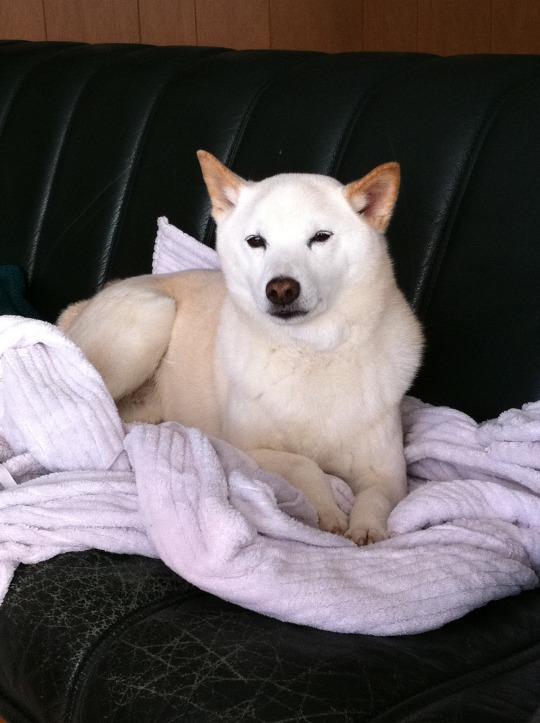
The resemblance is truly striking, and yes, he was short, fast, and not prone to smiling.
Surprises—I couldn't predict how any of these matchups would go down, but I was most interested in Keaton vs Sharif, as they are both SO hot in SUCH different ways.
SEMIFINALS:
This was such a good batch of semifinalist contestants. By this point I think we could all tell Mifune was unstoppable (though I thought Sharif might give him a run for his money), but I really didn't know which way Robeson vs Poitier would flip.
FINALS:
I wanted Sidney Poitier to pull a last-minute sweep out of nowhere, but alas, Toshiro is just THAT GOOD (maybe. I will admit that I find Toshiro's domination a little hard to believe, given the variety and hotness of all his competitors; the man is hot but all these men are hot). I'm still happy with how the tournament went.
FINAL MEDITATIONS:
Biggest shock of a dropout: the loss of Paul Newman
Biggest "you people have no taste": the loss of James Cagney
Biggest victory: Paul Robeson making it to the semifinals over often-assumed champion Gregory Peck
Biggest coalition who deserve justice: dancing men
Biggest ask character: vents anon (currently eating Laurence Olivier)
Biggest, uhh, anything: how many of you are here! I genuinely thought it would be me and 10 other people voting for the whole tournament. I'm thrilled it took off like this!
I think that's everything, but I'm happy to answer addl asks. And THANK YOU to everyone for your tags, rants, impassioned propaganda, beautiful pics, and love for the hot men! See you for the ladies!
434 notes
·
View notes
Text
I love making these it's kind of a problem now
WHAT EACH RDR2 GANG MEMBER WOULD POST ON SOCIAL MEDIA (my opinion)
Dutch - 10 minute tiktok rants about why the USA is failing (normally stitched from a news clip) - with a small cult like following with about 150 likes
Hosea - Outdoor skills teaching videos (hunting and whatnot) with all the comments saying hes like a Father figure
Arthur - Pretty photos of Forest animals on Insta without a caption
Bill - stitching people on tiktok challenging them to fist fights and those "what happened to real men" tiktoks
Javier - Music covers on guitar (very popular)
John - (1899) shitty gaming clips with NO schedule like sometimes 9 months apart
Abigail - get ready with me ranting about her child and husband
Jack - (1907-11) posting videos of his family being stupid without them knowing (80% Uncle and John)
Mary-Beth - Novel bios and links to her online Wattpad
Tilly - cute trends on tt often with her friends (like dances or cool transitions)
Karen - funny ass one-liner captions making fun of things
Miss Grimshaw - Those "Mother how do i" videos in her spare time
Reverend - Bible passages with a 9 minute rant after and then every week an accidental upload whilst shit-faced
Molly - shopping hauls that turn into vents
Strauss - Links to his business (regularly asks the younger members how to use functions and what things mean)
Trelawny - Magic tricks and Dramatic storytelling (everytime in a random place people find funny)
Sean - 20 second rant that's unironically hilarious and gets made into a template
Lenny - Book readings and 5 minute stitches respectfully arguing against the people he doesn't agree with
Charles - Never uploads aside from once a photo of Arthur next to an animal in a really pretty outdoor scenery
Sadie - secret videos of people like Pearson doing something embarrassing (inspired Jack to do the same) and "pranks"
Uncle - going out in public and doing something outrageous that ends in him being arrested (was nudity 9 times)
Micah - thirstraps
Pearson - videos on his wild "adventures" whilst cooking in the backround (the comments bully his food and his adventures)
Kieran - Horse Care videos (fully anonymous and would blur his face on everything). Lots and lots of horse videos
Yall remind me who I forgot
#john marston#arthur morgan#rdr2 arthur#john rdr2#dutch van der linde#rdr#red dead redemption 2#red dead redemption community#red dead fandom#red dead redemption two#micah bell#rdr1 jack#adult jack marston#rdr2#red dead 2#rdr2 dutch#javier escuella#rdr2 javier#bill williamson#marion williamson#hosea matthews#abigail marston#charles smith#sadie adler
145 notes
·
View notes
Text
'Well, let's just say there's someone in the music industry--a fairly famous someone--and he's pretty certain it [Starting Over] was written for Paul, and that Paul damn well knew it was...but that in the wake of John's death most everyone thought it would be disrespectful to Yoko and Sean to dispute who John had in mind while writing it. We were talking about it after an email correspondence I started having with a friend here who says she believes it was as well. I agreed with her. So, being my curious self, I just had to ask around, and that's the information I got. Whether it's totally 100% or not, I can't say. But hearing about it from this guy in particular was enough to confirm my belief that it was. It's not only his opinion but something that seems to be pretty well known amongst a lot of industry folks. We talked about it at great length and honestly, I was a bit surprised it was something he feels so strongly about....as well as their relationship, in general. When I told him straight out at first that I thought they were a 'couple', he said, "Well, no shit! Anybody who thinks otherwise has to be a fucking idiot!" I thought that was funny as hell! Not to bash the nay-sayers round these parts, but this guy isn't one to mince words and I'm just repeating what he said so don't go yellin' at me. Couldn't help laughing when he said it. And he knows a LOT of people in the business. Far more than I could ever dream of encountering...'cause he's quite a bit older than me and way more experienced in these circles. He used to be a session player ages ago and branched out on his own a long ways back....so he's definitely been AROUND and knows his shit when it comes to the 'who's who' of the music world and all the dirt that gets turned up at its surface. I trust him totally or else I wouldn't be so certain he's right about the stuff he says. He even said that the 'recording-style' and vocal effects used on that song, in particular, are what John specifically wanted in order to send a certain message to Paul." ------------------------------------------------
This is a comment made by a woman in an old forum, who said she spoke to an industry insider. I have read many similar comments (and I myself have been in contact with someone who claimed to have spoken to a couple of people who were once close to the Beatles) that have said that John and Paul's relationship was an open secret in the music industry. Maybe that's why Howard Stern is often asking Paul a lot of uncomfortable questions about John, and even suggested that "Maybe I'm Amazed" was written for John, lol.
202 notes
·
View notes
Text
Bombshell Report! Sean “Diddy” Combs Indicted on S*x Trafficking and Racketeering Charges: Unveiling the Dark Side of an Industry Giant
Sean “Diddy” Combs faces explosive charges of s*x trafficking, racketeering, and coercion. The music mogul’s dark secrets unravel in a scandal that could expose Hollywood’s darkest underworld. Will Diddy’s tapes and client list shake the industry to its core? Breaking news!
#pay attention#educate yourselves#educate yourself#knowledge is power#reeducate yourselves#reeducate yourself#think about it#think for yourselves#think for yourself#do your homework#do some research#do your research#do your own research#ask yourself questions#question everything#p diddy#sex trade#sex trafficking#child trafficking#save the children#save humanity#crimes against humanity#news
72 notes
·
View notes
Text
Books I’ve consumed so far in 2024:
The Order of Time by Carlo Rovelli
I Contain Multitudes: The Microbes Within Us and a Grander View of Life by Ed Yong
Something Deeply Hidden by Sean Carroll
How to Read Nature: An Expert’s Guide to Discovering the Outdoors You Never Noticed by Qarie Marshall
Helgoland: Making Sense of the Quantum Revolution by Carlo Rovelli
The World According to Physics by Jim Al-Khalili
How Not To Kill Yourself: A Portrait of the Suicidal Mind by Clancy Martin
How Far the Light Reaches: A Life in Ten Sea Creatures by Sabrina Imbler
A Series of Fortunate Events: Chance and the Making of the Planet by Sean B. Carroll
Listen: On Music, Sound and Us by Michel Faber
The Art of Communicating by Thich Nhat Hanh
I am a Strange Loop by Douglas R. Hofstadter
Transgender Warriors: Making History from Joan of Arc to Dennis Rodman by Leslie Feinberg
Spectrums: Autistic Transgender People in Their Own Words by Maxfield Sparrow
All the Flowers Kneeling by Paul Tran
Supporting Transgender Autistic Youth and Adults by Finn V. Gratton, LMFT, LPCC
Nisa by Marjorie Shostak
Determined: A Science of Life Without Free Will by Robert M. Sapolsky
21 Lessons for the 21st History by Yuval Harrari
The Book Of Secrets by Deepak Chopra
The Joy of Science by Jim Al-Khalili
The Rock Warriors Way by Arno IIgner
The Pursuit of Endurance by Jennifer Pharr Davis
Quantum Mechanics, Technology, Consciousness and the Multiverse by Martin Ettington
Born to Run by Christopher McDougall
Connecting with the Autism Spectrum by Casey “Remrov” Vormer
Light Falls: Space, Time, and an Obsession with Einstein by Brian Greene
A Walk In the Woods by Bill Bryson
10 Days in Physics that Shook the World by Brian Clegg
On Being a Therapist by Jeffrey Kottler
Atlas of the Heart: Mapping Meaningful Connection and the language of the human experience by Brene Brown
What do you really want? By Cayla Craft
The Peaceful Warrior by Dan Millman
How to Write an Autobiographical Novel by Alexander Chee
Chemistry for Breakfast by Dr. Mai Thi Nguyen-Kim
The Creative Act: A Way of Being by Rick Rubin
A Molecule Away from Madness by Sara Manning Peskin
Quantum Wonder: How the Tiny Drives Our Immense Reality by Carl AL-Khalili
Building a Life Worth Living by Marsha Linehan
How to Know a Person: The Art of Seeing Others Deeply by David Brooks
Speed Reading by Kam Knight
Being You: A New Science of Consciousness by Anil Seth
You Are Not an Imposter by Coline Monsarrat
You are the Placebo by Dr. Joe Dispenza
Welcome to the O.C.: The Oral History by Alan Sepinwall
Heartbreak: A Personal and Scientific Journey by Florence Williams
DBT Made Simple: A Step-by-Step Guide to Dialectical Behavior Therapy by Sheri Van Dijk MSW
Move on Motherf*cker: Live, Laugh, and Let Sh*t Go by Jodie Eckleberry-Hunt, Emma Bryne PhD
Cognitive Behavioral Therapy: Real and proven strategies for managing anxiety by Charlie Norman
CBT Workbook: 7 Strategies to Overcome Anxiety, Depression, Anger, Panic, Worry, Intrusive Thoughts by Mind Change Academy
Dialectical Behavior Therapy: A comprehensive guide to DBT and using Behavior Therapy to Manage Borderline Personality Disorder by Christopher Rance
Somatic Psychotherapy: A Comprehensive Guide to Theoretical and Practical Considerations by Hale Boyd
Dialectical Behavior Therapy: Regulate Emotions, Panic, Anger. Guide for BPD by Dustin Drig
How Confidence Works: The new science of self belief by Ian Robertson
Fear: Essential Wisdom for Getting Through the Storm by Thich Nhat Hanh
The God Equation by Michio Kaku
Dialectical Behavior Therapy by Cindy Crosby
Brief Answers to the Big Questions by Stephen Hawking
Quantum: A Guide for the Perplexed by Jim Al-Khalili
Zen and the Art of Saving the Planet by Thich Nhat Hanh
Einstein in Time and Space: A Life in 99 Particles by Samuel Graydon
Reality is Not What It Seems by Carlo Rovelli
Resurrecting the Body, Reinventing the Soul by Deepak Chopra
A Brief History of Intelligence by Max Bennett
What the Future Looks like by Jim Al-Khalil
Retirement 101: From 401(k) Plans to Social Security Benefits to Asset Management by Michele Cagan
Still the Mind by Alan Watts
Anchor System Thinking by A.I. Shoukry
Finance Basics by Harvard Business Review
The Power of Now by Eckhart Tolle
A Brief History of Earth by Andrew Knoll
The Physics Book by DK
Investing for Beginners by David Cohne
The 48 Laws of Power by Robert Greene
Drink? The New Science of Alcohol and your Health by Professor David Nutt
Unique: The New Science of Human Individuality by David Linden
Psychedelics by Professor David Nutt
What do you need? By Lauren Wesley Wilson
Can’t Hurt Me by David Goggins
Endure by Cameron Hanes
Being Peace by Thich Nhat Hanh
Die with Zero: Getting all you can with your money and your life by Bill Perkins
How Humans Evolved by Robert Boyd and Joan Silk
No Bad Parts by Richard C. Schwartz,PHD
The Matter of Everything: How Curiosity, Physics, and Improbable Experiments Changed the World by Suzie Sheehy
The Radium Girls by Kate Moore
Bumpin: A Modern Guide to Pregnancy by Leslie Schrock
Choose Strong by Sally McRae
Outgrowing God by Richard Dawkins
Can We Talk about Israel? By Daniel Sokatch
Black Holes and Baby Universes and Other Essays by Stephen Hawking
Hal Koerner’s Field Guide to Ultra Running by Hal Koerner
The Science and Art of Running by Cooper Barton
Eat and Run: My Unlikely Journey to Ultramarathon Greatness by Scott Jurek
North: Finding my Way While Running the Appalachian Trail by Scott Jurek & Jenny Jurek
7 Habits of Highly Effective People by Stephen Covey
Securities Industries Essentials by Kaplan
Above the Clouds by Kilian Jornet
What is Life? by Paul Nurse
What I Know For Sure by Oprah Winfrey
A New Earth by Eckhart Tolle
Mastering Logical Fallacies by Michael Withey
This is why you Dream by Rahul Jandial,MD,PHD
The Tao of Running by Gary Dudney
Astrophysics for People in a Hurry by Neil DeGrasse Tyson
The Magic of Reality by Richard Dawkins
Parallel Worlds: A Journey through Creation, Higher Dimensions and the Future of the Cosmos by Michio Kaku
Dance of the Photons by Anton Zelinger
Quantum Body by Deepak Chopra
The Heart of Understanding by Thich Nhat Hanh
Annuity 360 Learn All You Need to Know About Annuities by Ford Strokes
Quantum Entanglement by Jed Brody
Relationships by Ram Dass
The Way of Zen by Alan Watts
Ultimate Confidence by Ralf Aabot
101 Essays that will Change the Way You Think by Brianna Wiest
The Science of Happiness by Brendan Kelly
Fighting for our Friendships by Danielle Bayard Jackson
One Day My Soul Just Opened Up by Iyanla Vanzant
K2: Life and Death on the World’s Most Dangerous Mountain by Ed Viesturs and David Roberts
Know that I Am by Eckhart Tolle
Girls Like Us by Sheila Weller
Love Sense: The Revolutionary New Science of Romantic Relationships by Dr. Sue Johnson
Girls that Invest by Simran Kaur
Slow Productivity by Cal Newport
Greenlights by Matthew McConaughey
Stillness Speaks by Eckhart Tolle
Retroactive Jealousy by Vincenzo Venezia
Right Thing, Right Now by Ryan Holiday
The Best American Essays 2022 by Alexander Chee & Robert Atwan
Talking to Strangers by Malcolm Gladwell
Insecure in love by Leslie Becker-Phelps PHD
Codependent No More by Melody Beattie
Be Here Now by Ram Dass
Reality, Art, and Illusion by Alan Watts
Thinking Fast and Slow by Daniel Kahneman
We Will be Jaguars by Nemonte Nenquimo
List of Books I Consumed in 2023:
The Last climb by David Breashears, Audrey Selkeld, and Audry Salkend
What is Life by Schrodinger
A Brief History of Time by Stephen Hawking
Beyond Feeling: A Guide to Critical Thinking by Vincent Ryan Ruggiero
Furniture by Kevin Sheetz
A Short History of Nearly Everything by Bill Bryson
Relativity by Albert Einstein
Tao Te Ching by Lao Tzu
An Immense World by Ed Yong
Quantum Supremacy by Michio Kaku
White Holes by Carlo Rovelli
A Separate Reality by Carlos Castaneda
Outlive by Peter Attia
Until the End of Time by Brian Greene
Tribe by Sebastian Junger
Ghosts of Everest by Jochen Hemmleb
Attached by Amir Levine and Rachel Heller
Mind and Matter by Schrodinger
Wired for Love by Stan Tatkin
Grit by Angela Duckworth
The Subtle Art of Not Giving a fuck by Mark Manson
Metamorphosis by Franz Kafka
The Ethical Slut by Janet Hardy and Dossie Easton
Meditations by Marcus Aurelius
The Power of Myth by Joseph Campbell
The Fabric of the Cosmos by Brian Greene
The Body Keeps the Score by Bessel Van Der Kolk
Committed by Elizabeth Gilbert
Homo Deus Summary a Brief History of Tomorrow by Yuval Harari
Alone on the Wall by Alex Honnold
Why we Believe in God (s): A Concise Guide to the Science of Faith by J. Anderson Thomson
Physics and Philosophy: The Revolution of Modern Science by Werner Heisenberg
The Tao of Physics by Fritjof Chopra
Sacred Woman by Queen Afja
Everest: The West Ridge by Thomas Hornbein
Tracks by Robyn Davidson
The Ink Dark Moon by Ono no Komachi and Izumi Shikoku
Einstein by Walter Isaacson
Learned Optimism by Martin Seligman
55 notes
·
View notes
Text
:TMNT 2012 MASTERLIST:
Shared Headcanons:
2012 Boys When Reader Uses The Same Weapon As Them
2012 With A Famous Reader
2012 Boys With A Mutated Child Sibling Reader
2012 Boys When Child Reader's Teddy Bear Rips
2012 Boys When Sibling Reader Draws A Family Picture
2012 Boys With A Big Sis Reader
2012 Boys With A Mother Figure Reader
What The 2012 Boys Call Their S/O
2012 Boys When Their Big Sister Gets Mutated
2012 With A Friend Who Listens To Sean-Nós Music
2012 Boys With A Male S/O Who's Stronger Than Them
Leo:
Dating Leo Headcanons
Admiration? No, Love.
My Hero
Leo With A Secret Hacker Girlfriend
Leonardo Cuddle Headcanons
Mikey:
Practice
Oblivious
Dating Mikey Headcanons
Mikey With An Assasin Girlfriend
Honey I'm Home
Donnie:
Supplier
Rest Your Eyes
Donnie Cuddle Headcanons
Crush Much?
Pick-Up Line
Overprotective
Dating Donnie Headcanons
Donnie With A Secret, Boxer S/O
Hello Mr. Turtle
Donnie With A Collector Little Sibling
Raph:
Feelings
Dating Raph Headcanons
Raph With A Secret, Softie S/O
Not So Fragile
Other:
Daredevil Pt:1 Pt: 2 Pt: 3
One For The Books
Adopted??
Call Me Karma
Splinter With A Secret Girlfriend
Introduction
Free Time (Karai x Fem!Reader)
Code Of Conduct
Ice Cream Run (Casey Jones x Reader)
Truths And Lies Pt: 1 Pt: 2 Pt: 3
Home Is Here
#tmnt#tmnt x reader#x reader#leonardo x reader#donnie x reader#raphael x reader#leonardo x reader tmnt#mikey x reader#tmnt 2012 x reader#tmnt 2012#tmnt 2012 raph#older sibling reader#sibling reader#platonic x reader#tmnt x reader platonic#karai x female reader#tmnt 2012 karai x reader#normie writes#casey jones x reader#casey x reader
584 notes
·
View notes
Text
flu confession.
kazutora hanemiya x fem!reader
notes: classic old school fluff, shy tora (*ᴗ͈ˬᴗ͈)ꕤ*.゚
wc: 587

his voice is so stuffy over the phone.
“hurrgh,” kazutora groans. you can picture the scene now— him swaddled in layers of blankets, desperately trying to get over the flu. it’d be funny if it didn’t sound like he was two seconds from sneezing every time he spoke.
you call out his name and he goes, “huh?” in return. “oh, i didn’t mean to call somebody. uh, i’ll hang— achoo!”
you chuckled in response.
“poor you. get well soon, kazutora. don’t worry, i made extra notes and got you the handouts for the lessons you missed!”
“no, no, hang on,” he says, sniffling. “don’t go.”
his voice is strained, but he still sounds grateful for the time. “you don’t have better things to do? like... hang out with friends or whatever?”
“it’s 4 in the morning man..”
“yeah, uh, true.” he pauses, “what’re you doing up so late?”
“can’t sleep haha, plus it’s raining. i thought i could listen to some songs down the nostalgic lane.”
“oh, you’re a music girl, hmm?” he grins behind the screen, you can tell he likes the sound of that. “whatcha listening to?”
“not really.” you chuckled softly. “oh, right now.. don’t laugh but it's beautiful girls by sean kingston. kinda random, i know.”
hanemiya raises his eyebrows. “that’s a catchy song. i’ll be honest with you, though, most would’ve said taylor swift or... uh, i dunno, i’m running out of examples.”
he laughs, “so do you usually stay up this late all the time or is it the storm?”
you laughed along. “honestly, both.”
“yeah, i’m with ya there. the rain’s pretty relaxing, but it’s also kind of lonely.”
he pauses. “can i ask you something?”
“sure, what’s up?”
“you’re not gonna think it’s stupid?”
“let’s hear it first.”
“well…” he gulps, “do you think we’d make a good couple?” his voice is shaky but he says it anyway.
that made you sit straight up, staring at the phone in disbelief. the time keeps on running and you still couldn’t believe your own ears.
“..why would you think that, kazutora?”
“well.. i’m not sure, really. i just...”
he trails off, ‘just’ almost turning to ‘got a crush on you’.
“never mind,” he says quickly. “i’m just tired and sick. i shouldn’t say things like that.”
“i, uh.. it’s fine.” you chuckled nervously.
shoot i don’t even know what to say, you thought to yourself.
“yeah, okay.” he sniffles again. “can... uh... can you keep a secret, (y/n)?”
“of course.”
“okay. so, uh…”
there’s silence for a moment. kazutora takes a deep breath, then spills his guts. “i’m really into you.”
the boy blushes but he swore it’s just his fever acting up. “i’ve thought about it for a while, but i didn’t want to ruin anything. but we always get along and you’re really funny. and pretty.”
he clears his throat. “‘m i embarrassing myself?”
“no.. not at all, kazutora. thank you, you’re so sweet. i think you’re kinda cute too.” you let out a nervous laughter.
“wait, really?” his voice is a jumble of different emotions. surprised. happy. relieved. nervous. he doesn’t try to hide them very hard.
“are you just saying that?”
you laughed quietly at his remark. “no, i mean it.”
“oh. okay then.”
tora’s heart is about to jump out of his chest, but when did it ever listen to him before?
“so... do you want to hang out sometime?” he asks, trying to sound nonchalant. “when i’m not dying of the flu, of course.”

please do not steal, copy, translate, repost to other sites or claim my writings as your own. plagiarism is real!
so so cute (˶ᵔ ᵕ ᵔ˶) please do like/reblog/interact if you enjoy reading this hehe, always appreciated ♡♡
#🐯 luna writes#🐯 luna's fics#tokyo revengers#tokyo revengers x reader#x reader#tokyo revengers imagine#tokyo revengers fluff#tokyo rev#tokyo rev x reader#tokyo revengers kazutora#kazutora hanemiya#kazutora x reader
209 notes
·
View notes
Text
Entirely Forbidden and Completely Fucked. (A Wincest fanfic.) Chapter One
NSFW. 18+. MDNI.
Pairing: Wincest + half-sister.
Summary:
Life was good for y/n Everhart, not perfect, but close to it. She lived the perfect life that Sam and Dean dreamed of their whole lives. Nice house, rich, friends, the white picket fence life. She had friends, not many but the circle she kept was close knit and stuck together. She got bullied for how she dressed and the music she listened to, but she never backed down from a fight, and she never lost one either.
All of that changes when her mom- her best friend in the world, is brutally murdered. And she is sent away to live with the only living blood-relative she has.
Her father John Winchester.
A man who came into her life only a couple of times a year, and never stayed. Not only does she know next to nothing about him and what he actually does for work, but she also has no idea that she has two half-brothers, Sam and Dean, who seem a little too close at times. And she’s determined to find out why.
Afterall, all secrets inevitably come to light. And when they do, y/n will have a choice: join in or remain on the outside looking and wanting in. No matter how completely forbidden and entirely fucked it is.
With two months until her eighteenth birthday, she’s going to have to find some way to pass the time until she is free to leave with her inheritance, and live the rest of her life as far away from them as humanly possible. But will she still want to when the clock runs out? Or will she stay for the love she shouldn’t want?
“You can choose the comfortable, or the meaningful. Choose Wisely.”
Content and Trigger Warnings
Wincest: Sam and Dean are full siblings, and the reader is their half-sister. John is the father of all of them.
Explicit and on-page sex scenes.
FM, MM, and FMM
Snowballing (Do yourself a favor and Google it, or don’t and be surprised.)
Orgasm Denial and Overstimulation
Extremely Possessive Sam and Dean
On-Page Violence, Gore, and Death
Voyeurism and Exhibitionism
Semi-Public and Public Sex
Gun Play
Knife Play
Blood Play
Damn, you’re still here?
Read the next line.
Good girl.
Now, start reading.
Chapter One
Y/n
“All packed?” The police officer asks me as I gather my bags by the front door. His smashed-in pug face looks down at me as he leans against the door, and it takes everything in me now to smash it against the doorframe over and over again.
I take a deep breath and force a smile. “Yup, all done,” I respond. A rumble comes down the long driveway to the home I’ve lived in my entire life. A black four-door Chevy Impala that I see maybe once or twice a year.
“Looks like your dad is here,” the pug face cop says like it’s not the most obvious thing in the fucking world. He lifts his big body off of the wall with a grunt and leans down to grab my bags. “Let's go,” he instructs as he walks out the door with one of my duffle bags.
I look behind me one last time, soaking in every memory I had here growing up. Outback is the swing set my mom would push me on as a kid. The window by the couch would always squeak when I would sneak out and back in, threatening to wake up my mom when she’d fall asleep downstairs. The stairs where I broke my arm because I thought a cardboard box was a sled on a snowy hill. So many memories are in this house, very few of them with the man who claims to be my dad. None with the two half-brothers I just learned about when John called and told me I was coming to stay with them.
I close my eyes and take a deep breath, inhaling the sweet smell of lemon and lilies. The smell of home. My home that isn’t mine anymore, not now that mom is dead. I choke back the ball in my throat and force the tears not to fall. I won’t break in front of John, and certainly not in front of… What were their names again? Sean? Derek? Fuck, I don’t remember. Guess I’ll find out soon enough.
I sigh and walk out the front door, closing it behind me for the last time. I lug my other two bags down the porch while John talks to Pug Face.
“Let us know if you need anything. You can contact me at the precinct. My number is on the back of the card. Rest assured, we’ll find out who it was, and they will be brought to justice,” Pug Face says, handing John a card.
“Thank you. I’ve heard good things about the work you fellas do here in Graham,” John says as he puts Pug Face’s card in his jacket pocket. John turns to me, and the corner of his mouth lifts into a smile. “Hey, kiddo. Ready to roll?” He asks me.
I nod once. “Looks like it,” I respond flatly, throwing my bags in the back seat. Pug Face clears his throat, and I turn to look at him. His face only serves to make me even more angry. Maybe it’s because he’s the one who told me my mom was murdered, or maybe it’s because he was the cop who worked at my school as a security guard and busted me for skipping class to smoke weed under the bleachers. That was a fun conversation with Mom.
“Be safe, y/n, you’ll be in my prayers. We shouldn’t need you to testify since you weren’t there when the murder occurred, but you’ll have the opportunity to make a victim impact statement at sentencing.” Pug Face tells me as he pulls out the keys to his squad car.
“Sounds great,” I respond a little more sarcastically than I meant to.
Pug Face furrows his eyebrows at me, his jaw clenching. “Behave yourself,” he warns.
I roll my eyes and John reaches his hand out to Pug Face. “Well, we should hit the road. Thank you again, Officer…?” his speaking falters.
“Nolan,” Pug Face reminds him as he shakes John’s hand. “And sure thing. I’ll contact you when we have more details and a suspect in custody.”
John smiles with tight lips and turns to me. “Let's hit the road.”
I climb into the passenger seat of his Impala, close the door, and put on my seatbelt as John starts the engine. In the side mirror, I watch my childhood home grow smaller and smaller before John turns onto the road, and it disappears completely. I sigh and lean back in my seat.
“Are you hungry?” John asks me a little while later.
I shake my head. “No, I ate before I left,” I respond, keeping my eyes out of the window.
“Alright, well, we’re not stopping until we get to Spokane, so I figured I’d ask,” he responds flatly.
My eyebrows lift slightly in annoyance. “Spokane it is.”
I watch out the window. Meridian turns into WA-162, then I-90 once we get toward Seattle. I don’t mind John that much. He isn’t the type to have pointless conversations just to fill the silence. Instead, he plays music in the car as he drives, old rock and roll, but I don’t mind the music that much either. I know quite a few of the songs that play and silently tap my fingers on my thigh to the beat.
“Almost there,” John says when we exit the freeway and enter the city of Spokane. “I’m stopping for dinner, you have a preference?” he asks as he turns onto the main street.
“Anything is fine with me,” I shrug.
“Pizza?” he asks.
“I’m pretty sure pizza falls under the anything category,” I retort with a smirk.
To my surprise, he laughs. “That it does,” he responds, pulls into a Pizza Hut, and puts the car in park. “Do all-meat and supreme fall into that category, too?” he quips.
I nod once. “That they do,” I smile for the first time all day. I unbuckle and open the door. “I’m coming in, too. I’ve had to pee since Ritzville.”
“Why didn’t you say anything?” John asks as he gets out of the car, too, and shuts his door.
“You said you weren’t stopping until we got to Spokane,” I shrug and open the restaurant door.
“Yeah, well, I would’ve at least pulled over so you could pop a squat,” he chuckles.
I roll my eyes and shake my head. “I’ll remember that,” I respond before leaving him to order and making my way to the bathroom.
I wash my hands and walk out of the bathroom once I’m done. I look around and find John waiting at a table on his phone. I pull out a seat across from him and sit down. “It’ll be about ten more minutes before it’s done,” he says to me without looking up.
“Great. I’m going to wait outside. I need a smoke,” I respond, standing back up.
John looks up from his phone and gives me a questioning look. “Smoke what, exactly?” He asks.
I shrug. “Just my vape. I’ll be by the car.” I tell him, pulling my Geek Bar from my pocket.
Joh nods once. “Stay by the car,” he instructs me.
I roll my eyes. He was barely in my life growing up, and now he wants to play the father act. Whatever. “Sure thing,” I tell him before walking back outside.
I lean against the car; the metal is hot under my t-shirt, but thankfully, the hot sun has started to go down. I take a long drag off my vape and blow the vapor into the evening air. Was it really just twenty-four hours ago that my mom was alive? Where is she now?
I take another drag from my vape and realize I need something a little stronger. I make sure John isn’t looking and grab my dab pen from the back seat. I turn it on and take a big hit. The smoke burns my lungs and singes my throat, but I welcome the feeling. I blow it out and cough a few times into my elbow. I take another hit, and this time, the smoke doesn’t sting my lungs and throat as much.
I let out a long breath. My body feels a little lighter, and my thoughts aren’t as loud. Just the kind of relief I need right now. I mean, how else is a girl supposed to deal with her mom dying and suddenly being forced into a side of her family she knew next to nothing about?
I shove my dab pen into the pocket of my denim shorts when I see John come back out with three pizza boxes and some smaller ones stacked on top. “Let's go,” he says, setting the boxes on top of the car before opening the door, grabbing them again, and getting inside.
I get back into the passenger side and shut the door. I put my seatbelt back on and take the boxes when John hands them to me to hold. “And don’t think I didn’t smell that when I came out. Next time, try not to be so obvious,” he says, starting the car again.
“Aye, aye, captain,” I mutter as he pulls back onto the main road.
A few minutes later, he pulls into a hotel parking lot. The building is dated, but at least it doesn’t look like it’s infested with rats and cockroaches. From the outside, at least.
“We’re only staying for a night. Is there anything you need for tonight from your bags?” He asks as he parks and turns off the engine.
“Nope, I can sleep in this,” I respond. We get out, and he grabs the pizza boxes from me.
“Well, if you change your mind, you can come grab what you need. Or, I’m sure Sam or Dean can loan you something for the night.”
Sam and Dean, noted.
John opens the door to the hotel room and holds it open for me as I walk inside. Sitting at a small table by the window is a man- one of my half-siblings, apparently. He has shoulder-length brown hair and brown eyes that match mine and John’s. He smiles at me with the corner of his mouth over his laptop and nods his head once.
“Where’s Dean?” John asks, setting the pizza boxes on the table.
So this one must be Sam.
“Went to get ice,” Sam answers shortly. “You must be y/n,” he says, turning back to me. He stands up, and holy shit, this mother fucker is tall. “I’m Sam. It’s nice to finally meet you.” Sam says in a friendly voice, offering me his hand to shake.
“Nice to meet you,” I shake his hand, trying not to sound as awkward as I feel. But at least he didn’t go straight for a hug.
“Well, dig in. I’m going to take a shower,” John says, grabbing some clothes from a bag and walking into the bathroom.
Me and Sam each grab a paper plate and open the boxes. I take a slice of all the meat and a piece of garlic bread and sit down across from Sam at the table.
Sam clears his throat and wipes his hands after swallowing his bite. “So, um, how was the drive?” he asks awkwardly.
Great, so he’s one for small talk.
I shrug my shoulders and take a drink of my water bottle. “It was fine. John played music the whole way.”
Sam nods and chuckles. “Yeah, Dean does that, too. Sorry, he doesn’t really listen to anything different.”
“It’s fine. Do you listen to anything else?” I ask, trying to keep the conversation going.
“Yeah, but don’t laugh,” he smiles.
The remark takes me a little aback. “Oh yeah? Try me,” I lift my chin.
“Celine Dion,” he smirks. I purse my lips, trying not to laugh. I’m not laughing at him. It’s just not what I expected. “I told you not to laugh,” he says as he laughs himself.
I chuckle and shake my head. “I’m not laughing at you, Sam,” I respond, but my laugh makes it a little hard to sound sincere. The dabs I took definitely helped to make me loosen up. “I listen to some different music, too.”
Sam raises his eyebrows, and he leans on the table with his elbows. “Really? Like what?” He asks.
“Don’t laugh,” I warn him with a smirk.
“I would never,” he chuckles teasingly.
My nose scrunches a little, and I smile. “Taylor Swift,” I admit with a chuckle.
Sam blinks a few times and I watch as he looks me up and down once, probably not believing me from how I dress. I can’t say I blame him. From my makeshift muscle tank from an old and ripped Linkin Park shirt, the studded belt on my denim shorts, my fish-net stockings under my shorts, and my beat-up vans, I probably don’t look like a Taylor Swift fan.
His eyes land back on mine, and he goes to say something until the door opens behind me. “Hey, Dean,” he greets my other brother. “Dad’s back with y/n,” he says.
I turn around to look at him, and his green eyes land on mine. Dean looks me up and down once and turns away, putting the ice container on the counter without saying a word. I bite the inside of my cheek.
Well, hello to you, too.
When Dean turns around again, he grabs a plate and takes five slices of pizza before kicking off his shoes and plopping down on one of the beds. “Where’s the remote Sammy?” He asks Sam.
Sam rolls his eyes. “Wherever you put it would be my guess,” Sam answers him and turns back to me. “Don’t mind him,” he nods his head to Dean.
“Wasn’t planning on it,” I mutter and stand up, throwing away my plate in the small trash can by the door.
Dean scoffs as the bathroom door opens, and John walks back into the room. “Oh, good, I see you met Sam and Dean,” he says, putting his old clothes into a bag.
“Yup,” I respond flatly, my buzz wearing off.
“Hardly,” Dean scoffs and turns on the TV he apparently found the remote to.
John sighs and crosses his arms over his chest. “Dean, we talked about this,” John says like it’s the millionth time.
“You talked, I listened,” Dean responds with an annoyed tone of voice.
John rubs his nose between his eyes like he has a headache. He lifts his head and turns back to me. “You can take my bed. I’ll take the couch.”
“I don’t want to be a bother. I’ll take the couch,” I tell John.
Dean laughs sarcastically. “Then why’d you come?” He asks, finally looking at me.
“Dean!” John snaps at him. My ears and face get hot. Fuck Dean, fucking asshole.
I straighten my back and glare at Dean. “Because he told me to come. Can you say the same?” I fire back.
Dean’s eyes flare, and his jaw ticks. “Fuck you,” he spits back at me.
“Dean! Enough!” John yells, slamming his bag down to the floor. “For fuck’s sake, enough!”
“Fuck this shit,” Dean says as he stands up and marches to the trash can right beside me. “Move,” he demands, reaching for the door behind me.
I roll my eyes and step to the side, allowing him a small path to get through. Dean shoulder-checks me on his way out, pushing me against the wall before he slams the door behind him.
Fuck you, too.
Author's Note:
I hope you enjoyed the first chapter. Don't worry, smut is coming! I just wanted to establish the story.
Please help a fellow and new Wincest writer out with a reblog; I would be eternally grateful. 🫶🥹
Chapter Two
#wincest#weirdcest#weirdcore#sam/dean#samdean#spn spicy fanfic#sam and dean#supernatural fanfiction#spn smut#spnfandom#spn fanfic#supernatural smut#supernatural#lemon#18+ mdni#mdni
42 notes
·
View notes
Note
I just came across your analysis of However Absurd and thought it was lovely. I'm curious, as someone who thinks John and Paul had some kind of romantic or sexual relationship, what is your take on The Lovers That Never Were? Is he using the word "lovers" to mean "partners"? I have always interpreted it to mean that Paul knows there was something there but it never happened. Every time I start to be convinced that they were together in some way I think of this song and the devastating way Paul sings it in the demo and the heartbreaking fact that he still felt it that intensely 13 years after John's death.
Oh wow thank you! The server had a lot of fun discussing that, if it's good it's because I had a little help from my friends heheh (─‿‿─) ♡
I ended up writing a massive novel in response to all this so I hope you enjoy reading it heheh. For server members, I've pulled some quotes from my previous Discord essays on this topic so you'll see some stuff that you've read.
tl;dr - I don't think "The Lovers That Never Were" contradicts the secret relationship theory at all! I think it compliments it very well actually.
In order to get into All That, I will outline how I perceive what their relationship was built on and how they reacted to it. I should note that I don't consider this definitive. It's important to remember that we all have unique interpretations of John and Paul because of our experiences and our personal POVs. There is no single answer until Paul decides to tell us what happened and/or Sean publishes John's diaries (written and audio). Until that happens, we are all forced to look at the same material and draw our own conclusions which will naturally be shaped through our personal perceptions. Some of us are older and are much closer to the original culture that John and Paul were raised in; some of us are younger and grew up in a much more LGBT+ positive environment. This naturally has an impact on how we interpret John and Paul's relationship.
I say this because I know my POV on John and Paul is a bit different from everyone else's. I'm a historian by training but part of being a historian is the understanding that you will never fully understand the events as they happened because your personal viewpoint and inherent bias is simply too strong. But that's okay because this is a part of humanity that we all share, yeah? With that understanding LET'S GO!
Paul My view on Paul is that he's always understood that he's different from other men. I doubt he could put a name to it until very recently. Paul has synesthesia, he's bisexual, he connects to music in a savant-like way, he's neurodivergent which is why he takes criticism so hard, and all of that would still be true even if he didn't have left over emotional issues from his mother dying the way she did + his fraught relationship with his father.
Keep in mind that circumstantial evidence points to the idea that Paul orchestrated the meeting at the fête! He realized he had a mutual friend with John in Ivan (who is to say that he did not meet Ivan at a QM performance and had that mental realization there?) He went through Hot Girl Summer before and after the fête, wanting to be fucking fit so that he wasn't embarrassed to meet John! I did the same thing when I had a crush as a teenager!
So with all that in mind, imagine this: you're Paul McCartney. You met John Lennon barely a year after Mary died. You turned 15 on June 18th, 1957 and met John at the fête on July 6, 1957. At some undetermined point before this garden party you saw a beautiful boy on the bus and began riding it obsessively hoping the Teddie boy would get on it. You followed him to the chippie and stood in line behind him…allegedly because you thought "oh wow he looks so cool." Marky Mark thinks (and I agree) that you may have even followed John to at least one Quarry Man show before the fête. Is this 'normal' behavior? Or is this the unhinged behavior of a teenager with a massive crush? The kind that comes about when you see a cute boy with red hair, and red is the color you associate with happiness, and then you find out that he plays guitar just like you and you follow him around until you see one of his performances and he's so good he knocks you back and then someone says "hi Paul, I didn't know you liked music!" behind you. And you realize that it's your friend and that you can meet the boy you have a crush on through this friend. You just need to lose weight and grow your hair out first.
When did Paul first see John, anyway? Before he turned 15 I'd wager.
I submit the idea that Paul has been in love John Lennon for his entire life. It will be 67 years of love when this July 6th rolls around. John was making a name for himself, he was known around town as "that Lennon." A minor celebrity like we’ve all had in our hometowns. Paul loved music. Before the internet you would go to the town square to hear a band.
Paul did that. Saw John. Pursued him with intent. When John went to Gambier Terrace to be with Stuart, Paul made a nuisance of himself showing up at their parties and playing the proto-version of "Michelle" in front of the girls…and John.
I love you, I love you, I love you That's all I want to say Until I find a way I will say the only words I know that You'll understand
I don't think that a 15 year old Paul McCartney would explicitly label his feelings for John as 'love' or a 'crush' but I do think that's what happened. When you're a teenager, a crush can express itself in many different ways. I used to have a big crush on a girl who was a volleyball player at my junior high school…that expressed itself as intense admiration. I even told one of my friends that I thought she was 'really cool.' It wasn't until later that I realized that I had a crush on her.
But I think that Paul has always known that he's 'different' and that he wasn't like other boys while growing up. Part of his touchiness about his looks comes from being bullied but I also think that he's a lot more self aware than he pretends to be. I think he realized relatively fast how he felt about John (maybe once John picked up with Stuart and Cynthia at art college.) I think he carried that with him for years hence his anguished response to being jilted in Hamburg and how furious he was at John for running off to Spain with Brian. He didn't realize it immediately but once it sticks to you then it fucking sticks. I think that Paul has done a lot internal wrestling with being a bisexual man and what that means for him and that he has been wrestling with it for decades. I think he was fully in the grip of that wrestling as he and John's friendship began growing and Paul realized what was happening to him. He does enjoy women but I also think that he felt it was necessary to pursue them heavily as a young man to camouflage himself.
I don't think a day has gone by since 1957 where Paul has not known what he was. What exactly that means for him…is up for interpretation. That's where the gray area is. But IMO Paul has almost always known that he's sexually attracted to other men and that John woke this in him. The big question for Paul is what he should do about it.
John There's been a lot written about John and his sexuality that I won't rehash here but truthfully I think John was in a similar place to Paul in knowing that he's always had a sexual preference for other men. John was a lot less comfortable about it though. Having unprotected sex with his girlfriends was, IMO, John trying to subconsciously engineer a situation that would "fix" him via an accidental pregnancy necessitating a marriage.
Of course that didn't do anything because it never does. John still felt chemistry with Paul when they met at the fête, with that quote about them "circling each other like cats." IMO John felt something immediately -- it's not entirely clear what -- though I don't think it "love at first sight" like with Paul. IMO their friendship, while still rooted in that chemistry, developed very naturally for John and he got to enjoy a platonic relationship with Paul before he put it all together. I say this because John saw Paul as a kid, not a peer, and that this endured for their lives in Liverpool pre-Hamburg. I struggle to imagine John or Paul deliberately inciting sexual or romantic contact during that time period aside from the group wank sessions (which were really trolling sessions from John.) Like, when Julia died, John went out and sought peers at art college like Cynthia and Stuart, other students his age. John and Paul bonded over losing their mothers and Paul has that quote about pranking people with the "oh yeah…my mum's dead thanks <3" bit but it also seems like John didn't want to be around that all the time. He lost his Uncle George and then his mother, he was starting to think that he was a death-curse on men in his family and that he brought suffering with him. He wanted to be away from that so he took a vacation from music to get a chance of scenery. Which meant putting Paul in a place of competition with Stuart and Cyn but I don't think John was thinking of that initially (though he exploited the situation later.)
Then Hamburg happens and they run wild. I have an entire meta about this that you can read here but I genuinely think John did not see Paul as a full fledged adult and potential sexual partner until they were in Hamburg in the red light district. I think that something happened there that we don't know about, that it's tied up in Stuart deciding to be with Astrid, John jilting Paul, Paul saying "fuck you I'm done" and getting a job at the coil winding factory in Liverpool after being deported, John tracking Paul down and spending weeks (probably) groveling and then giving Paul an ultimatum to come back to the Beatles. All of that screams 'I just realized I'm in love with my best friend and I'm freaking the fuck out' to me lmao.
John and Paul Of course something else changed after that too and John and Paul ended up becoming so close that even the Liverpool squares around them noticed. I think that whatever was going in their relationship, it started here. In the place where John and Paul were equally distraught with each other, the future of the band was uncertain, and Paul wanted a sign of commitment from John so that he didn't feel like he wasted years of his life. And of course John always felt compelled to be the man Paul wanted him to be so he treated Paul to a vacation in Paris which was so life affirming for them that it stayed with them for the rest of their lives. IMO the Paris vacation was explicitly romantic for them.
I think a switch flipped in 1961 and they went from "messing around" to "there's something there." It erupted in Paris and they showed each other more understanding and care then they expected from each other. John did sexy pin up poses for Paul in a bed that they shared; John remembers how the French held each other in their arms and just kissed each other, lovingly; Paul felt that he discovered the answer and that all those big name philosophers had nothing on the self realization he came to inside himself. Paul even took a photo of John that high lighted his package! Thanks to @louiselux for pointing this one out:

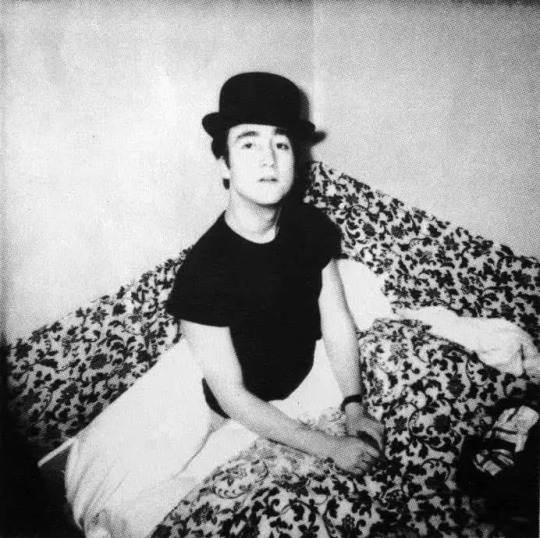
The thing was all the kissing and the holding that was going on in Paris. And it was so romantic, just to be there and see them, even though I was twenty-one and sort of not romantic. But I really loved it, the way the people would just stand under a tree kissing; and they weren’t mauling at each other, they were just kissing. — John Lennon, Playboy interview 1980
“We were like Paris existentialists. Jean-Paul Sartre had nothing on us. Sod ‘em all - I could write a novel… It was all inside me. I could do anything now.”
Paul McCartney, Anthology

Something happened in Paris and it wasn't just them getting haircuts and John buying Paul milkshakes. There was commitment there. And then the spell comes over them again when they return in January 1964:
The first night, John and Paul stayed in their suite, listening to records and reading fan mail. George, who had been signed for 100 pounds a day by the Daily Express to write of his experiences in Paris, went to a nightclub in the Place Pigalle.
Back in the City of Light, John and Paul slept till three o'clock in the afternoon. That much everybody agreed on.
Quote by Vincent Mulchrone from Daily Mail: George Harrison was astir early, but John Lennon and Paul McCartney slumbered on until frantic photographers forced them at lens point into the Champs-Élysées.
Derek Taylor (a British journalist) wanted to know why the Beatles slept so much. "My office wants to know what they're doing in Paris, so they'd better be doing something."
Love Me Do by Michael Braun
But I know what you're thinking. "What the hell does this all have to do with these two songs?"
And my reply is to keep a few things in mind:
Paul takes criticism and slights incredibly hard, possibly overreacting in some places and letting them overwhelm him mentally.
He never got over Barcelona, he never stopped resenting Stuart and Brian, he never got over John pulling the rug out from under him regarding the order of their names in the song credits. He contemplated committing suicide by smothering himself while he was in Scotland recovering from John leaving him.
John Lennon had a baby with a woman in the middle of all this. Julian Lennon was born April 8, 1963, conceived in July 1962, less than a year after Paris.
However Absurd & The Lovers That Never Were I listened to "However Absurd" and "The Lovers That Never Were" in that order. My immediate reaction is that these are both the same kind of song: they are both expressing sadness and frustration with John. This is a common theme with Paul's post-1980 John songs. What I find interesting is that they depict different though related gripes regarding John. In "However Absurd" Paul is expressing his longing for a cottagecore fantasy romance with John and then expressing frustration at John mocking him for it:
Ears twitch, like a dog Breaking eggs in a dish Do not mock me when I say This is not a lie
But in "The Lovers That Never Were" Paul expresses a different gripe: frustration that John won't commit to him and "anticipating" the break up that he secretly knew was coming ever since 1963 when John abandoned him and his own son to play patty-cake with Brian in Spain:
I hang patiently on every word you send Will we ever be much more than just friends? As for you, you sit there playing this game You keep me waiting
When all of the clocks have run down All over the world We'll be the lovers that never were
For as long as the sun shines in somebody's eyes I believe in you baby, so don't tell me lies For as long as the trees throw down blossoms and leaves I know there will be a parade of unpainted dreams
And I know dear, how much it's going to hurt If you still refuse to get your hands dirty So you, you must tell me something… I love you Say goodbye or anything
All of the clocks have run down Time's at an end If we can't be lovers we'll never be friends
John's penchant for disregarding Paul's feelings and even weaponizing them against Paul; the dashing of Paul's cottagecore dreams that were made and solidified in Paris; the fact that John, no matter what his intentions, could not get his shit together and commit to Paul no matter what he may have felt. These two songs are not contradictory to one another. Paul's idea of "commitment" looks very much like what he had with Linda and John in 1967: sharing a home, sharing a bed, being together every day, preferably somewhere green and remote. Exclusivity. Remember that Paul deliberately sabotaged his relationship with Jane Asher by nailing a woman in their bed when Jane came home, knowing perfectly well that he was breaking their exclusivity agreement.
That IMO, is what makes someone a lover and not just a friend you have sex with and secretly pine for. No cheating, or at least your agreed version of it. No disrespecting the relationship. Continuously being together. What did John do instead of this?
I think that Paul started out his "relationship" with John carrying high hopes and then watched them crumble to dust, over and over, because John simply did not take him seriously. He got Cynthia pregnant, he ran around on Paul with Brian, he had the nerve to flip out on Jane Asher when Paul brought her around when he was the one who couldn't stay faithful to Cynthia.
My hot take is that these songs demonstrate that Paul simply could not imagine John ever truly committing to him and treating him as a true partner. The homophobia and yes ~society~ is in there too but Paul was happy to flout this when it came to just about anyone else, traipsing all over France with Fraser and Mal. The difference is that he flat out didn't trust John. Being jilted for Stuart in Hamburg loomed too big in his head. Cynthia and Julian loomed too big in his head. Brian and Barcelona, realizing that John would happily betray whatever agreements or understandings he had with Paul simply to screw Paul out of a deal, loomed too big in his head. I think in particular its Barcelona that made Paul think John didn't value any of their professed ideals. John broke Paul's heart years before Yoko came along.
He didn't trust John. Fatalism is easier than taking control of your own life sometimes, and in Paul's mind there was no reason to believe John was genuine. Like, Paul knew John very well! He had very good reason to think that John was simply not serious about him. And John, no matter what his intentions were, proved that correct over and over and over and over.
So ultimately, I think that's what these songs are about. The melodies don't necessarily reflect this when I listened to them but I think that "The Lovers That Never Were" in particular is juxtaposing bitter wink-and-nod lyrics with an oddly perky tune. It's Paul laughing at himself for ever thinking John was willing to commit. He's mocking himself because while he allowed himself to get swept up in the dream of a possible genuine relationship with John, he knew deep down that it would go the way it did. That John would find a reason to get tired of him and abandon him. And then when Yoko came along, that's exactly what John did. Paul fatalistically accepted that the time had come and John met Paul's low expectations of him.
The Weight I don't think John and Paul necessarily planned to have a secret relationship. It seems more like they bundled the sexual/romantic stuff into their "thing" where it was just part and parcel of who they were and what they did. "It's only gay if the balls touch" etc. At some point that changed but Paul became convinced early on that it wouldn't work out so he didn't acknowledge his own secret desires and dreams. There was no roadmap between him and John about where they were taking this exactly and how they were going to make it work. He had sex with John and even engaged with romantic actions with John, hoping against hope that something would change and he would be proven wrong, but then John would be careless and Paul would collapse into hurt.
And oh yeah: Paul never, ever discussed any of this with John Lennon. He never told John how hurt he was because he didn't want to put up with John's derision. He felt devalued and lost and in typical Paul fashion he chose to ignore this for years and never bring it up, forcing it to come out in bizarre nonsensical actions when he inevitably boiled over. Why would he choose to confront it? He made sure to set up several safety nets to catch him! Jane and the Ashers, striking out on his own with "The Family Way" score, rubbing John's face in his escapades with other males as a way to go 'see, I don't need you just like you don't need me. How about THAT?'
I don't think John ever intended to hurt Paul as badly as he did. He thought that if Paul was upset about something then he would know via their ~telepathic connection.~ I think that he deliberately overlooked warning signs because he felt intensely guilty about certain actions he took (God only knows which ones) and that he helped himself not see Paul's hurt. I do think if he had the slightest idea of what was going on in Paul's head then he would have changed tactics immediately out of fear of losing Paul forever. But at heart John was a coward and if he didn't want to see something was wrong then he wouldn't see it unless something forced his hand. Like say, having his former best friend/ex-lover look him in the eye and go "I can write new songs" and kill The Beatles in a court of law. (And of course once he realized what he had done, years after the fact, it was too little too late. He couldn't take it back. How do you make up for inflicting that much hurt on someone that you supposedly care for? This paralyzed John for years.)
This was obviously a huge mistake and I think it was one of the landmines that blew their relationship up. Paul allowed his distrust and bitterness to overwhelm him. He should have been honest with John about his feelings; maybe not immediately but when they were able to look back with some perspective. Paul should have realized that their relationship could take heat. He should have trusted John more and if he had then John could have risen to the occasion. Everything could have been different. No more "I believe in you baby, so don't tell me lies." No more "Do not mock me when I say/This is not a lie."
He even expresses this in a third song, one that IMO puts this entire thing into perspective and ties these three songs together with a neat bow. "This One":
youtube
Did I ever take you in my arms, look you in the eye Tell you that 'I do?' Did I ever open up my heart And let you look inside?…
Did I ever touch you on the cheek Say that you were mine, thank you for the smile? Did I ever knock upon your door Try to get inside?…
Please take note of the bolded "Tell you that 'I do'!" Paul's deepest regret with regards to John is not trusting him more. He wishes that he had opened up to John about his hurt and how he angry he was that John was devaluing their relationship. That he wanted to commit to John but that he was scared John wouldn't say 'I do' back.
From John's POV he's just being John; he's looking out for the band. God knows he tried to be what Paul needed him to be but he got mixed signals and inconsistent behavior and Paul's ice queen behavior frustrated him to no end. This resulted in an endless circle of "fuck you/no no no, fuck YOU/well fuck you then!/fuck you" that ended up killing what they had.
But John is guilty in this too. He never made himself accountable to Paul. He didn't explain his actions. He acted rashly and selfishly and then was shocked when it blew up in his face. He didn't consistently act like he loved Paul. He took Paul for granted and told himself that he was doing the right thing, because changing your behavior is very very hard. He didn't let Paul in when it mattered.
Did you ever take me in your arms Look me in the eye, tell me that 'you do?'
As Paul grew up and he started to come to grips with the "What happened" of it all, maybe he realized that he had procrastinated. That he put off what mattered most because he couldn't bear to make himself vulnerable as a young man. Maybe he was waiting for a perfect moment to open himself up to John knowing perfectly well it would never arrive, a common delaying tactic for insecure and avoidant people. Not admitting that the perfect moment would never come and that he had to extend trust to receive it in return.
If I never did it, I was only waiting For a better moment that didn't come There never could be a better moment Than this one, this one
I think he's still angry at John for multiple betrayals, slaps to the face, and devaluing the specialness of their relationship and their affection for each other. But I also think that Paul is angry at himself for not trusting John, for not working harder at their relationship. He also delivered multiple betrayals and slaps to the face to John, feeding John's insecurity and fears of abandonment. Making a mockery of their relationship and how special it was. Paul has been doing public penance for this ever since John died, which snapped everything into perspective and he finally realized the full scope of his own screw ups.
Because it took two to destroy a relationship this intense and this special. If Paul did not know that before...
Well. He does now.
#the beatles#mclennon#john lennon#paul mccartney#mclennon meta#my meta#mclennon server#this was a really fun ask anon thank you!
93 notes
·
View notes